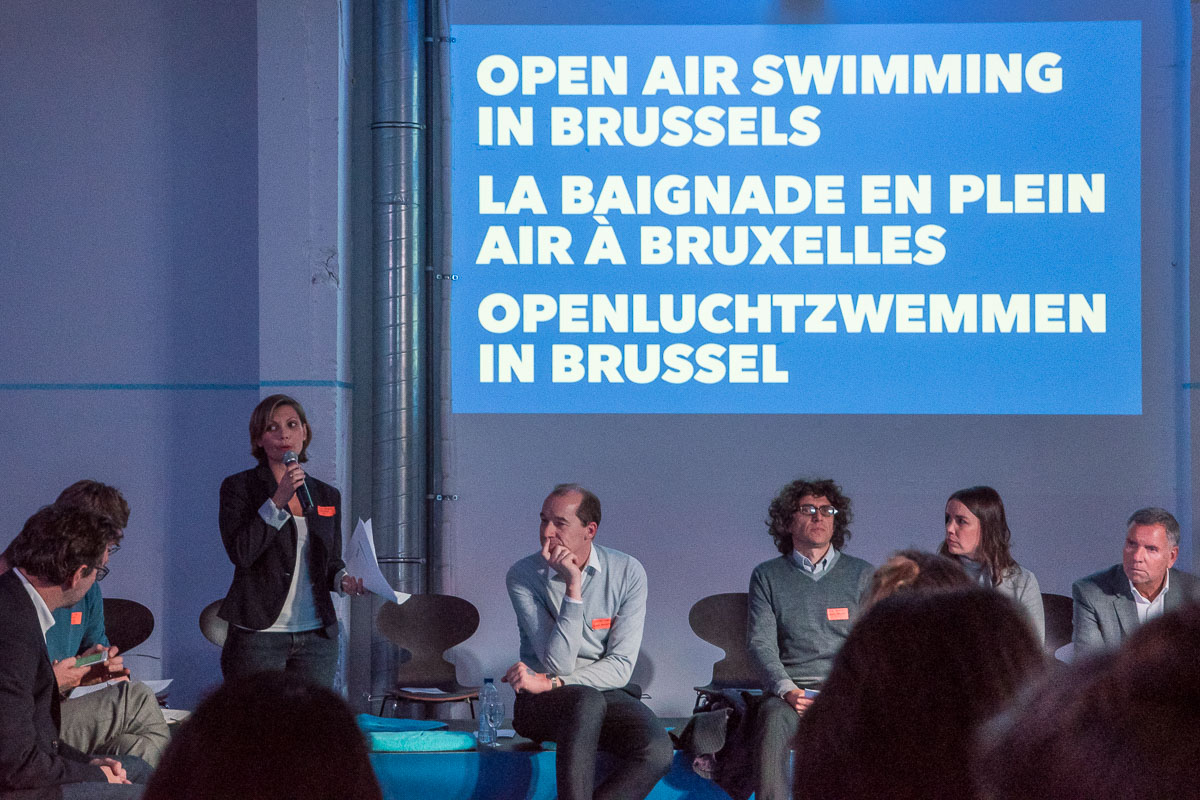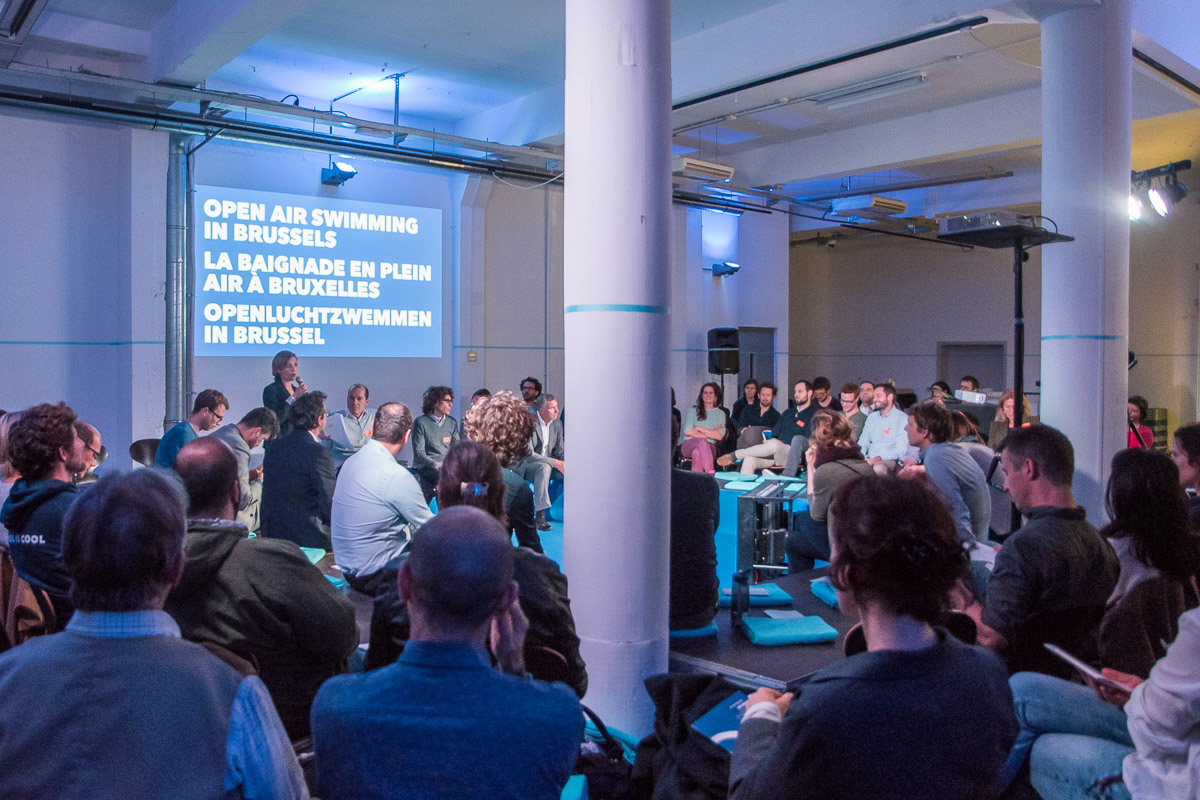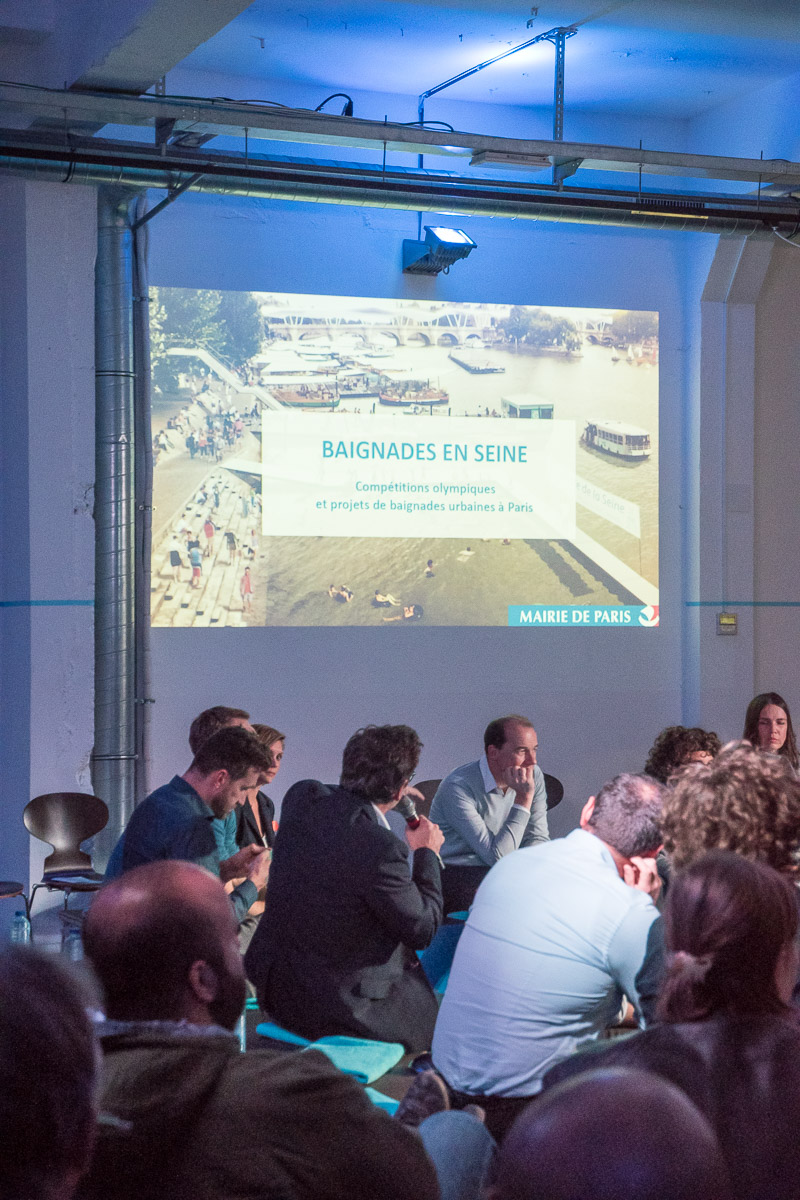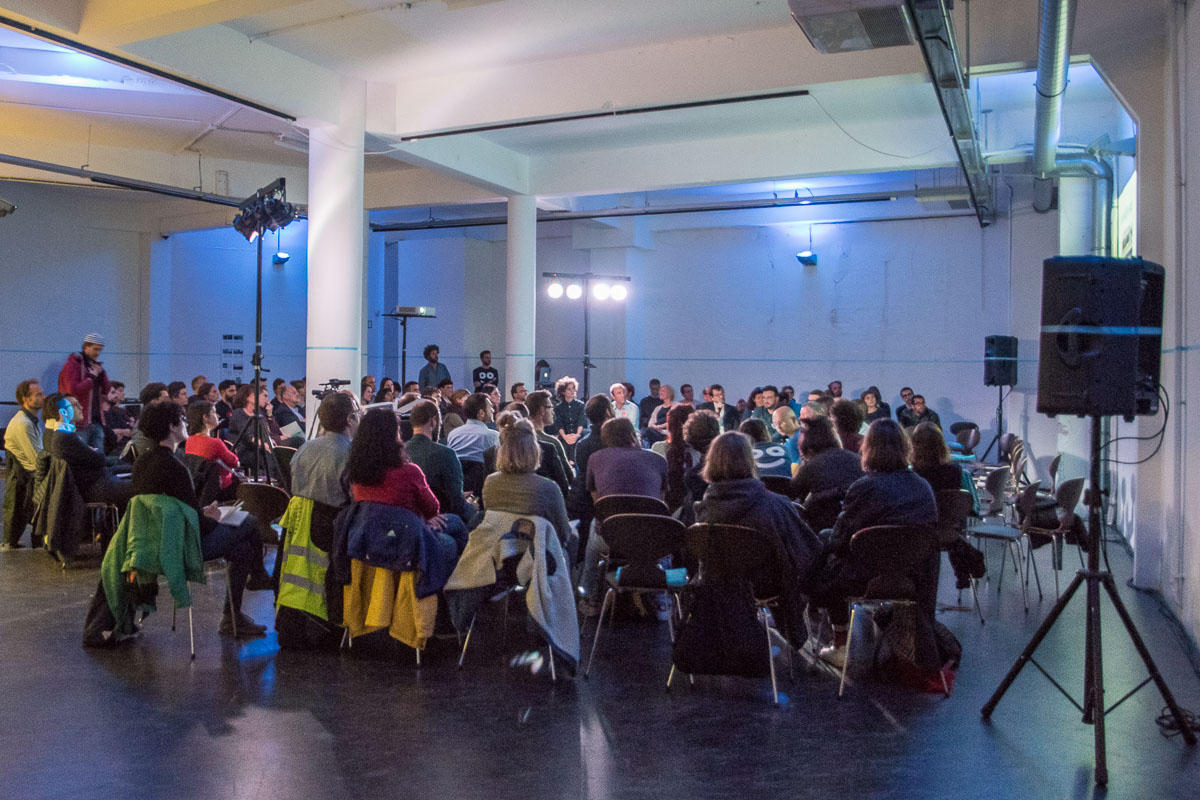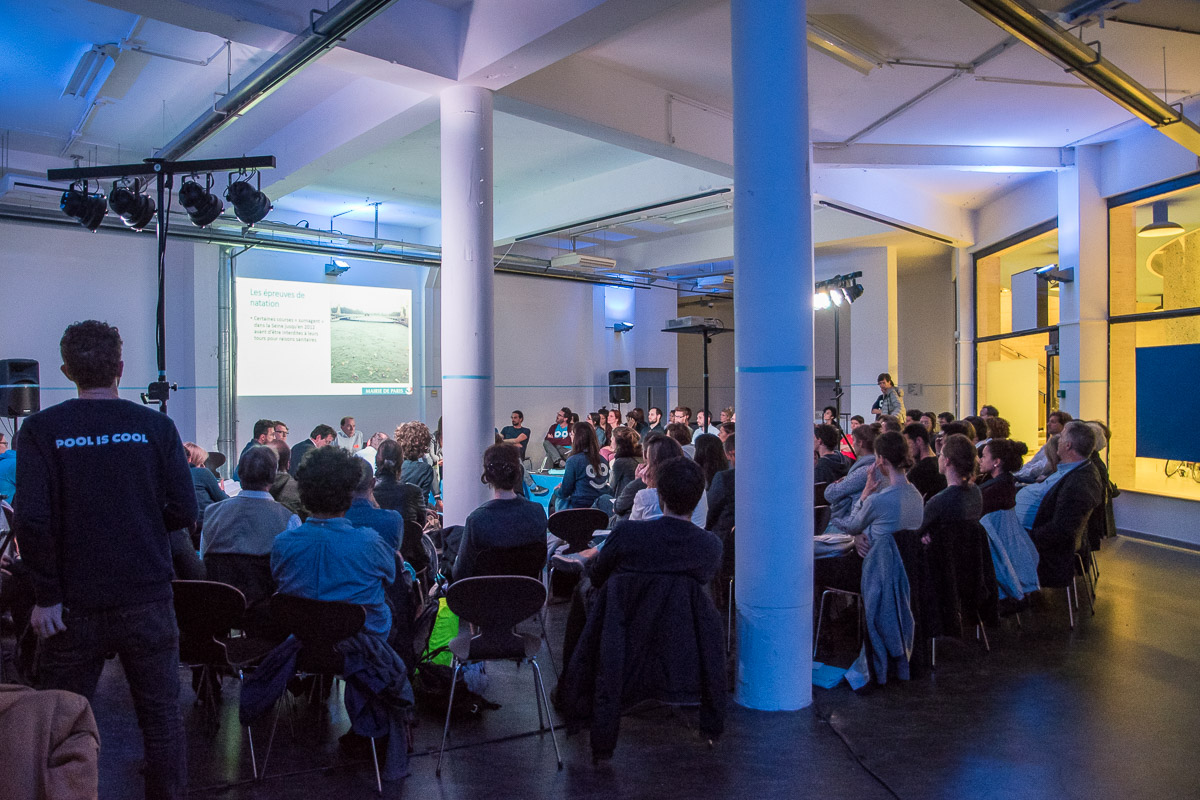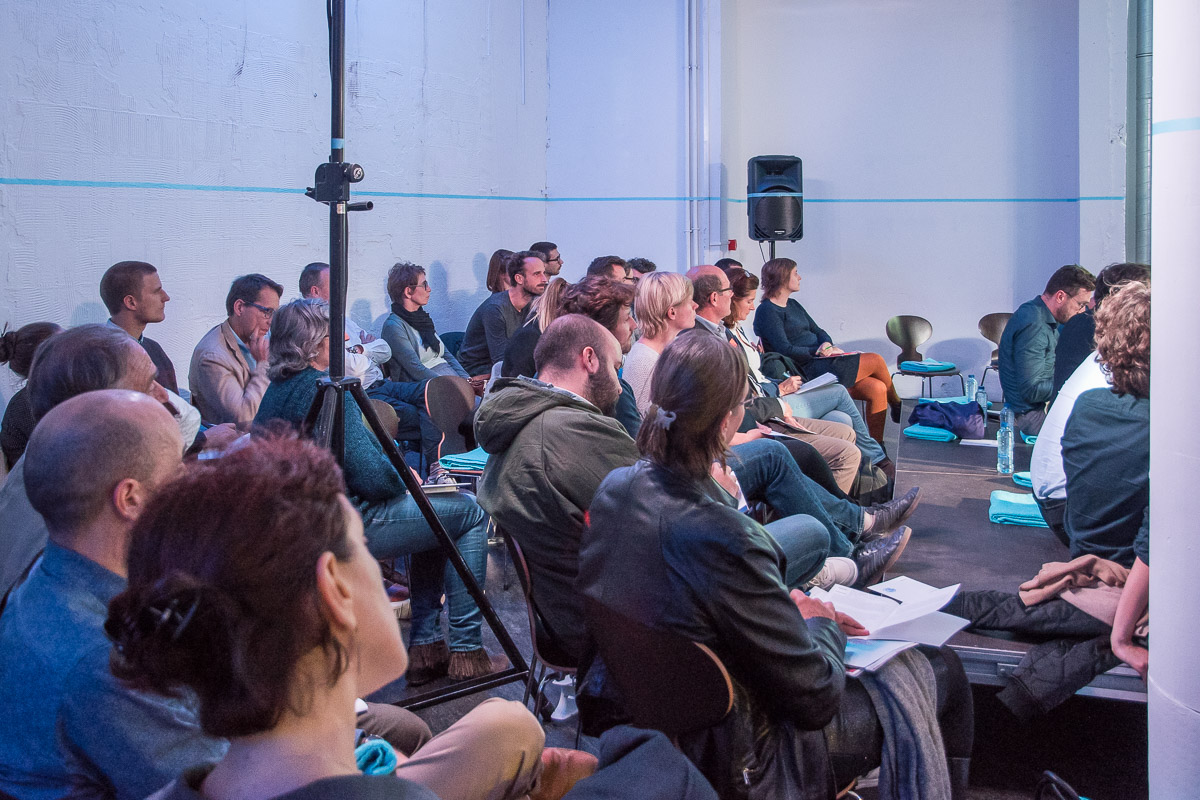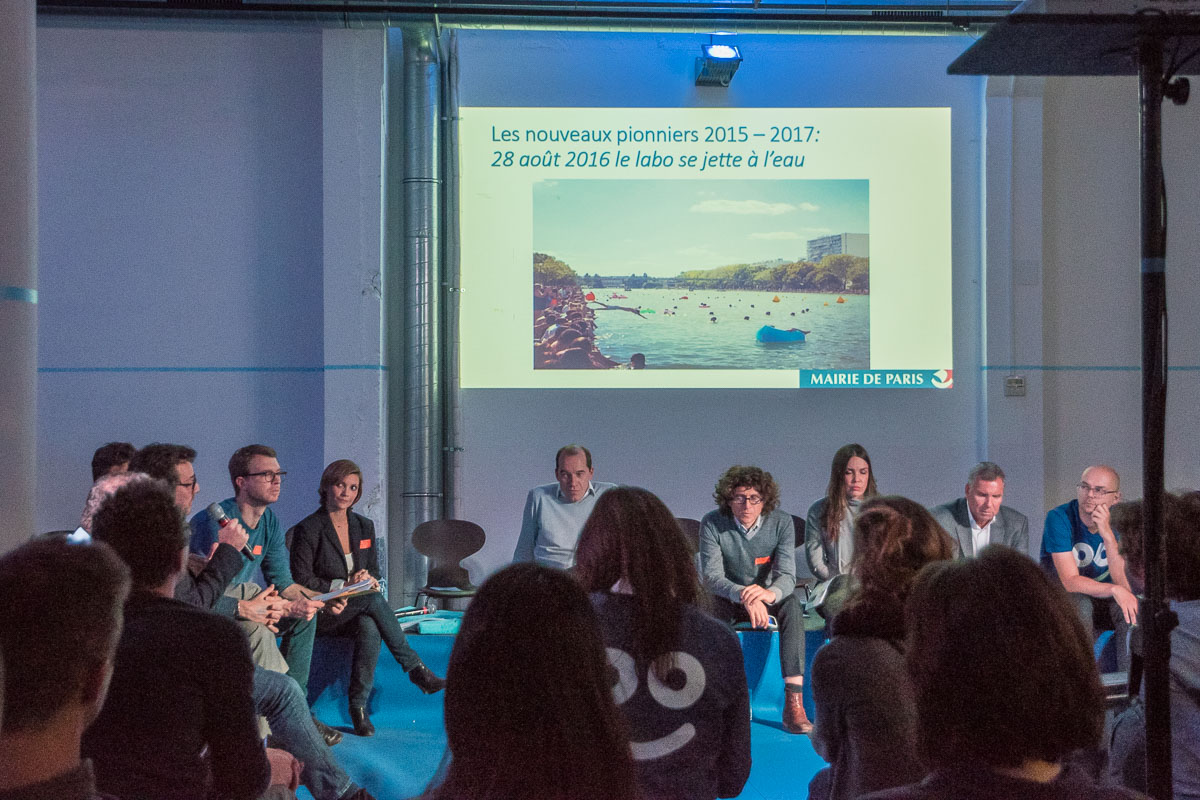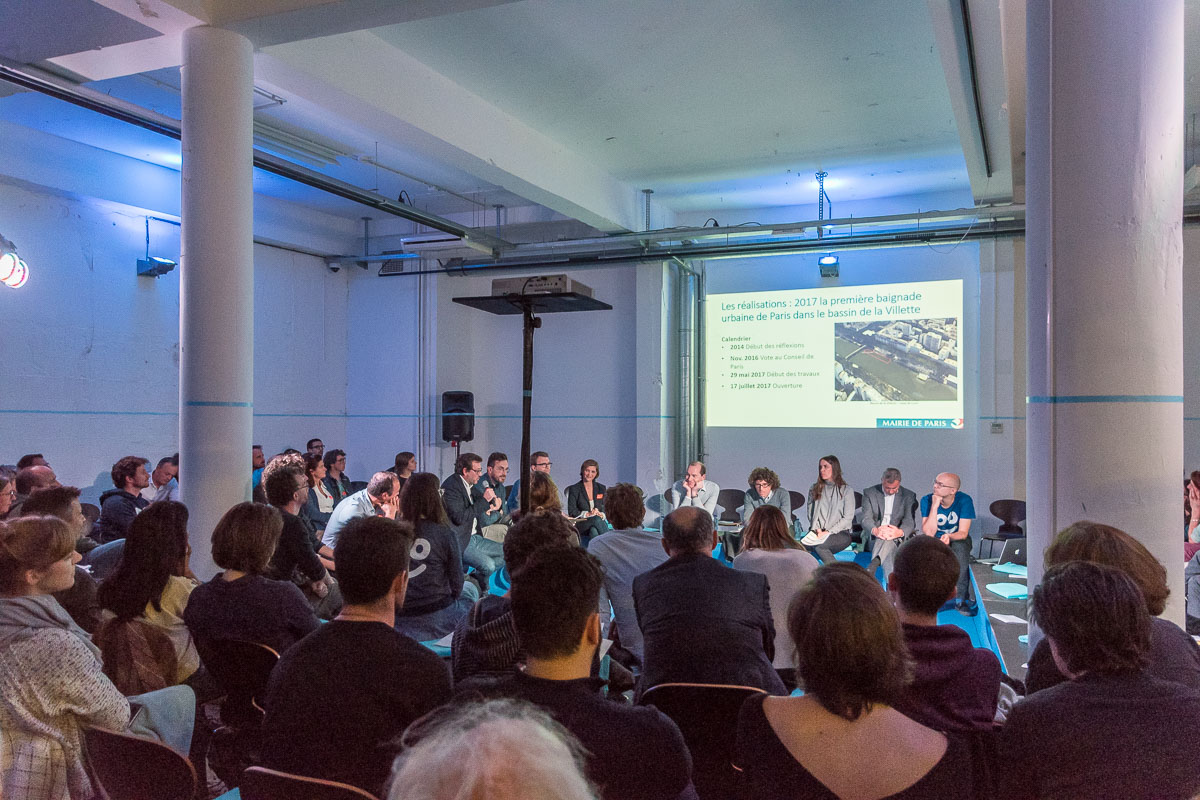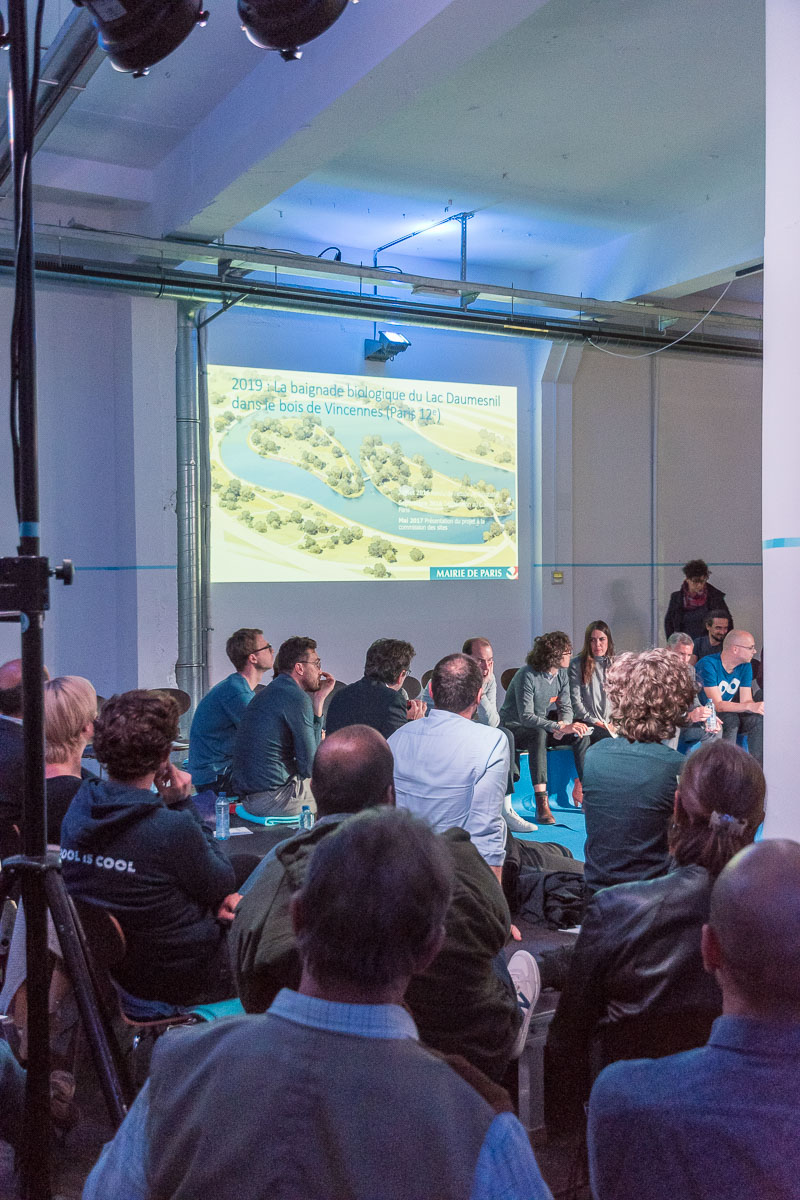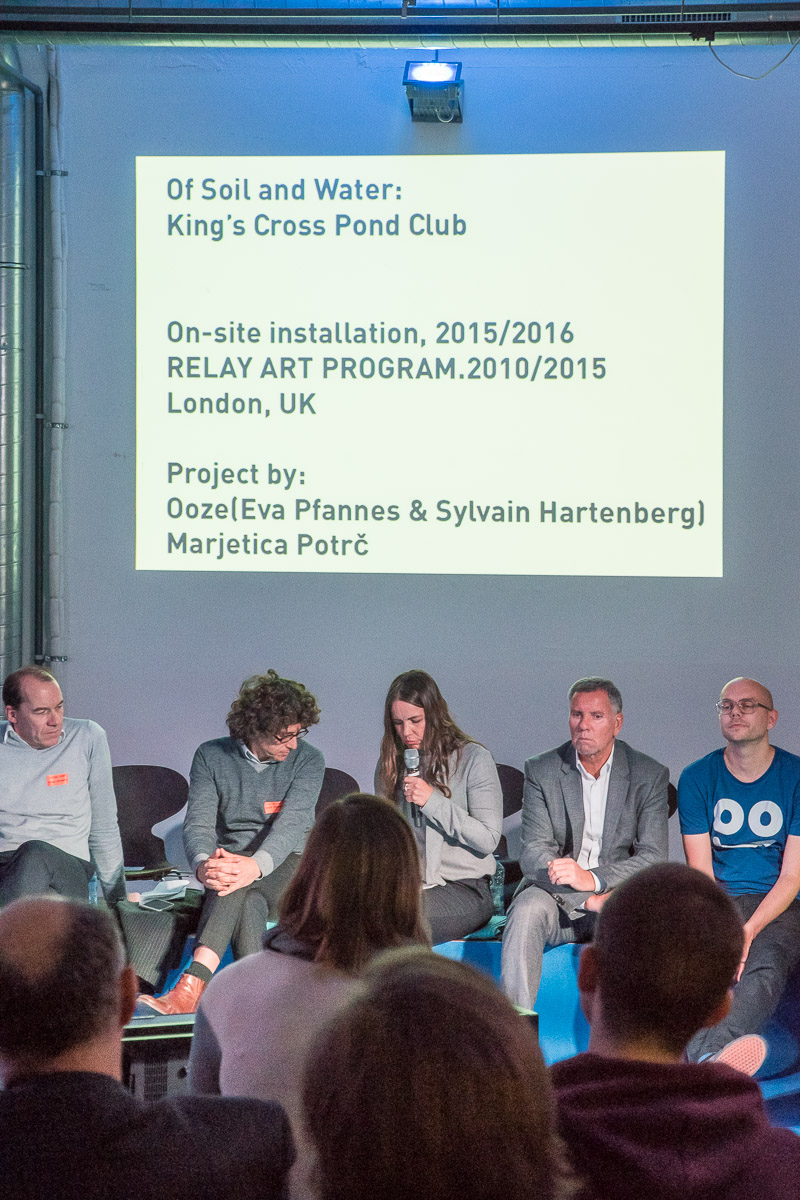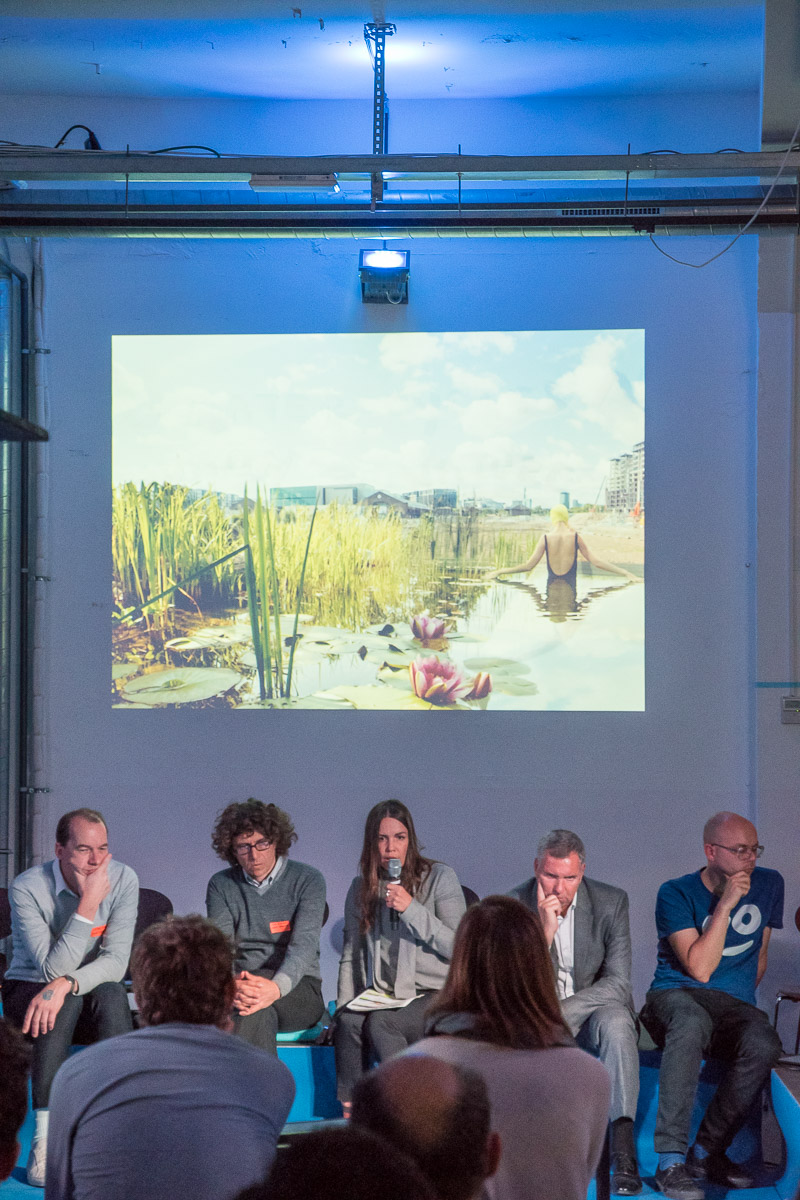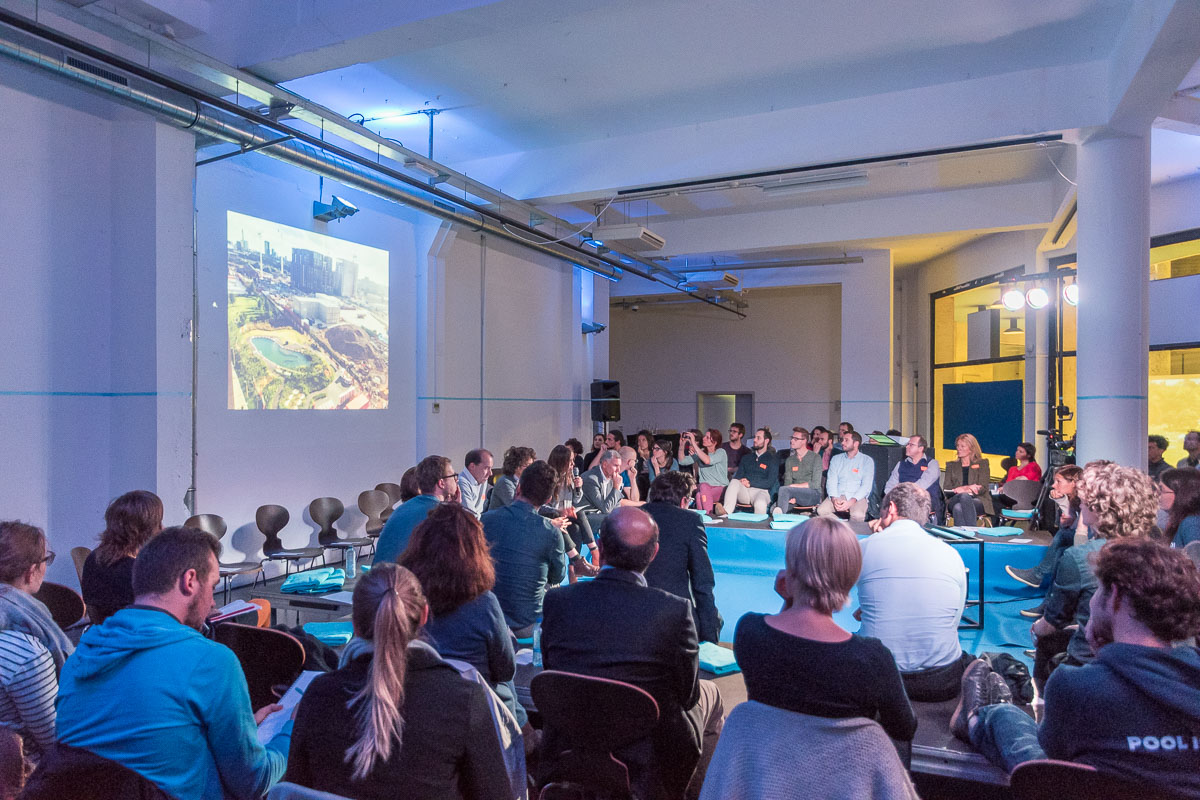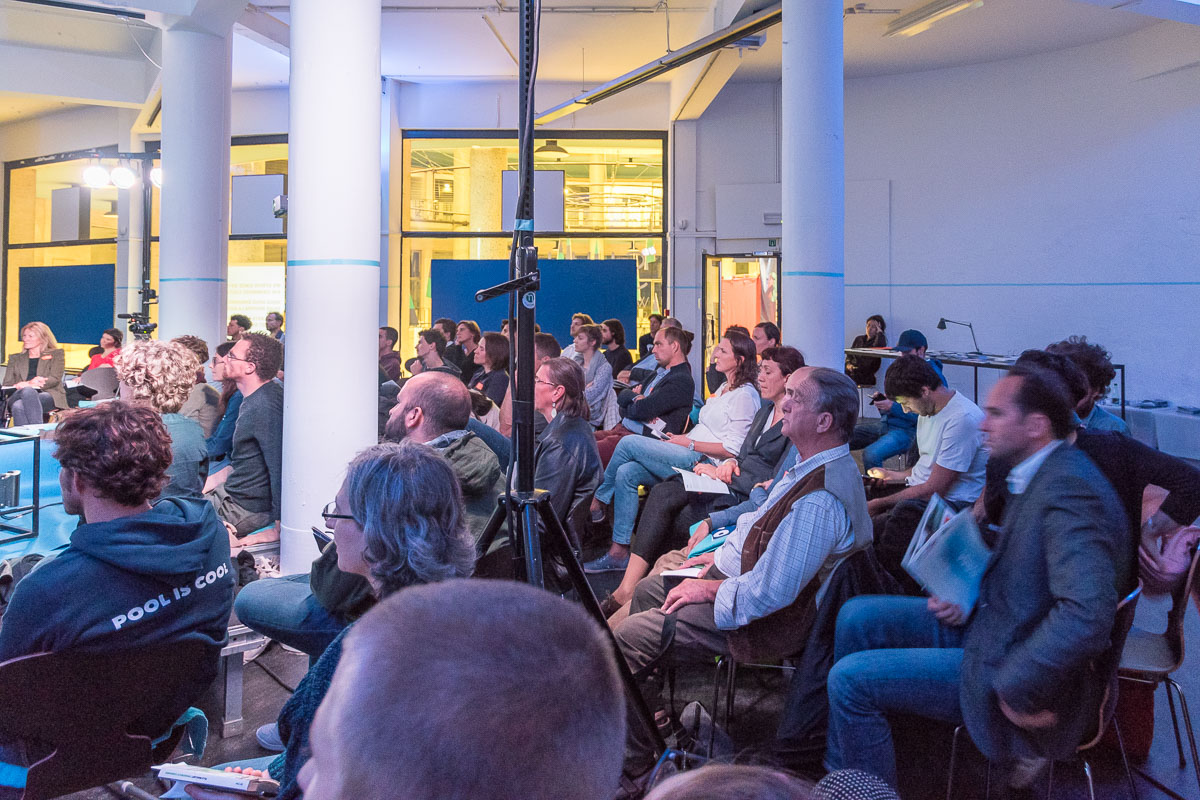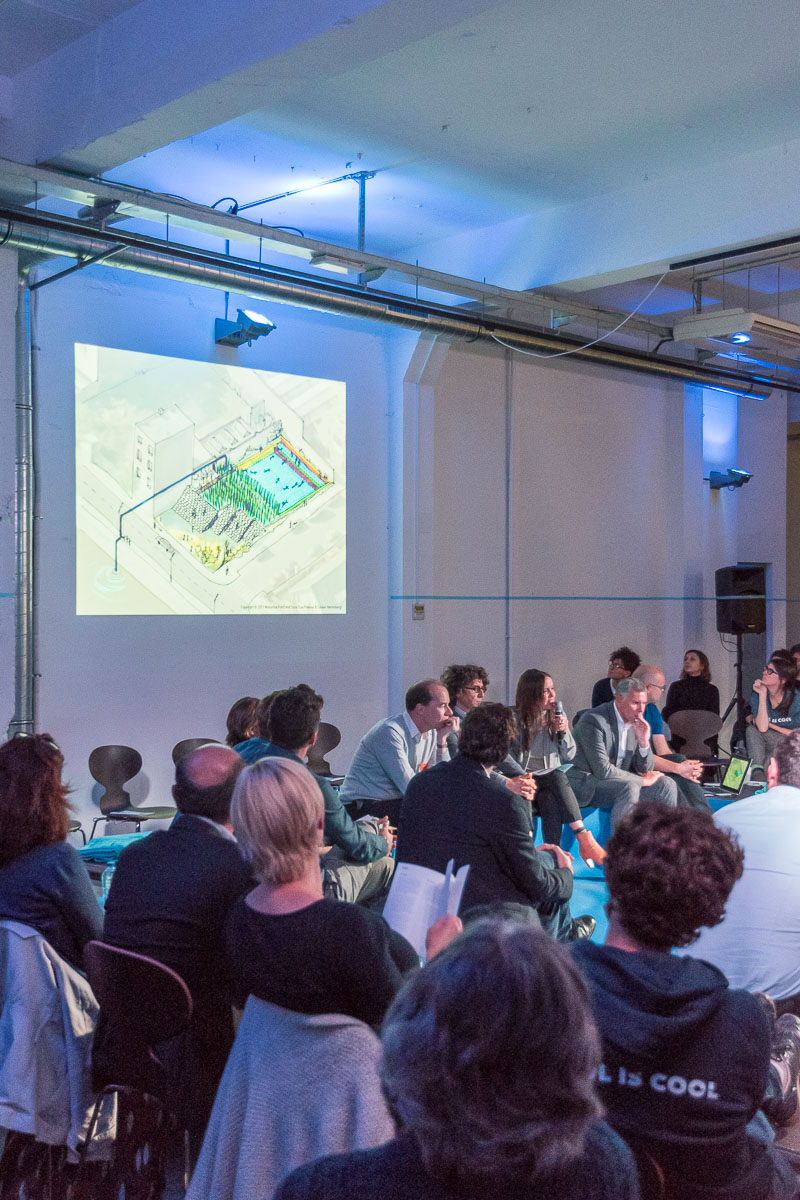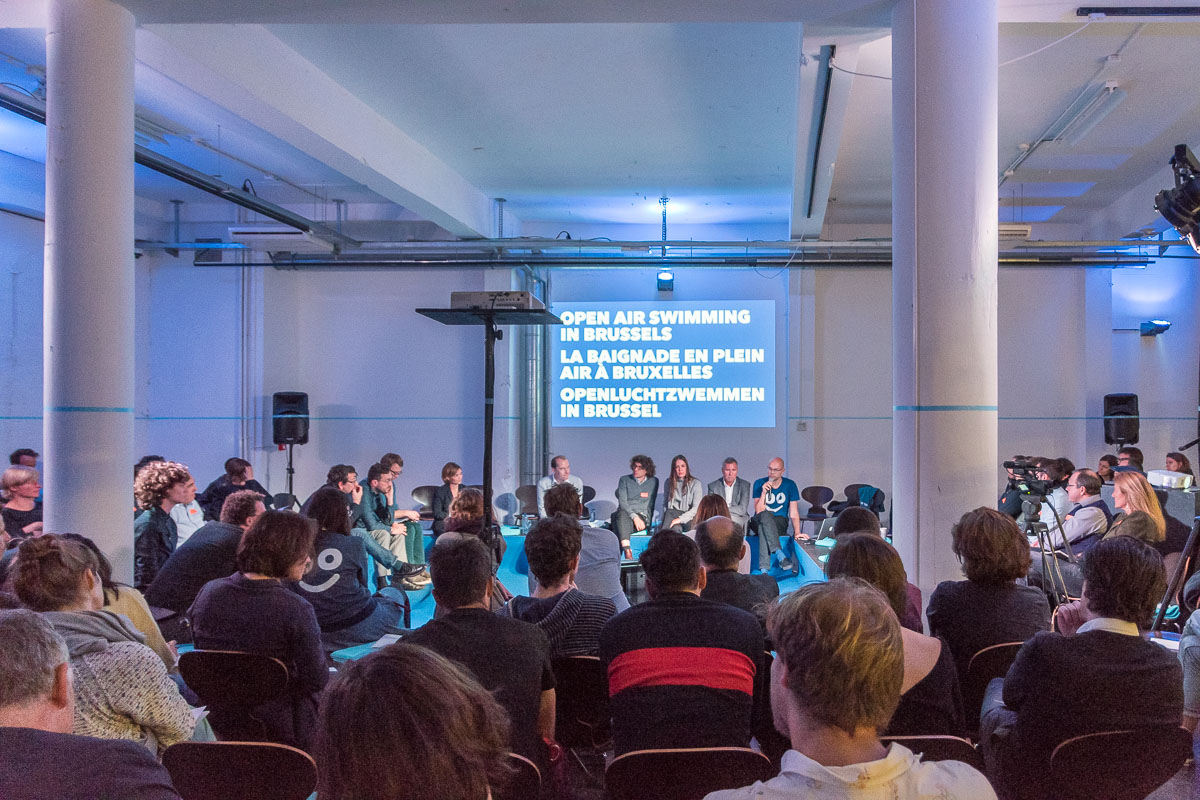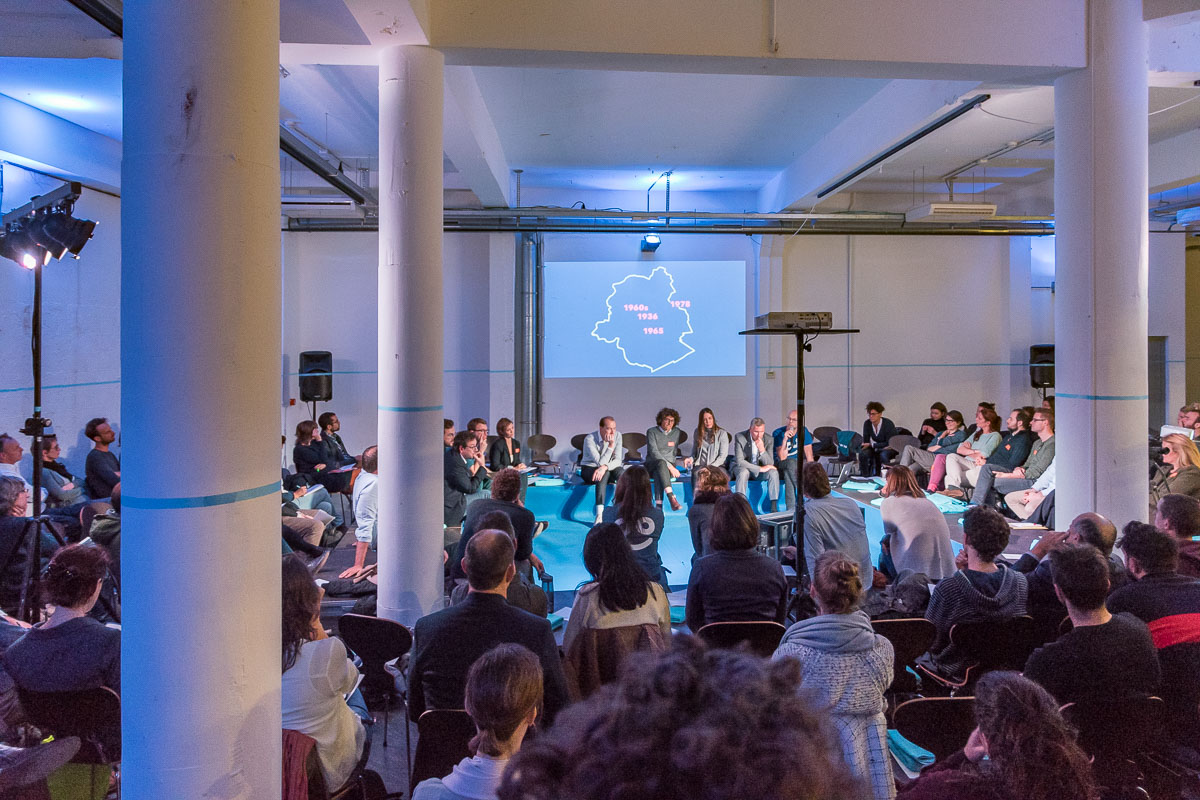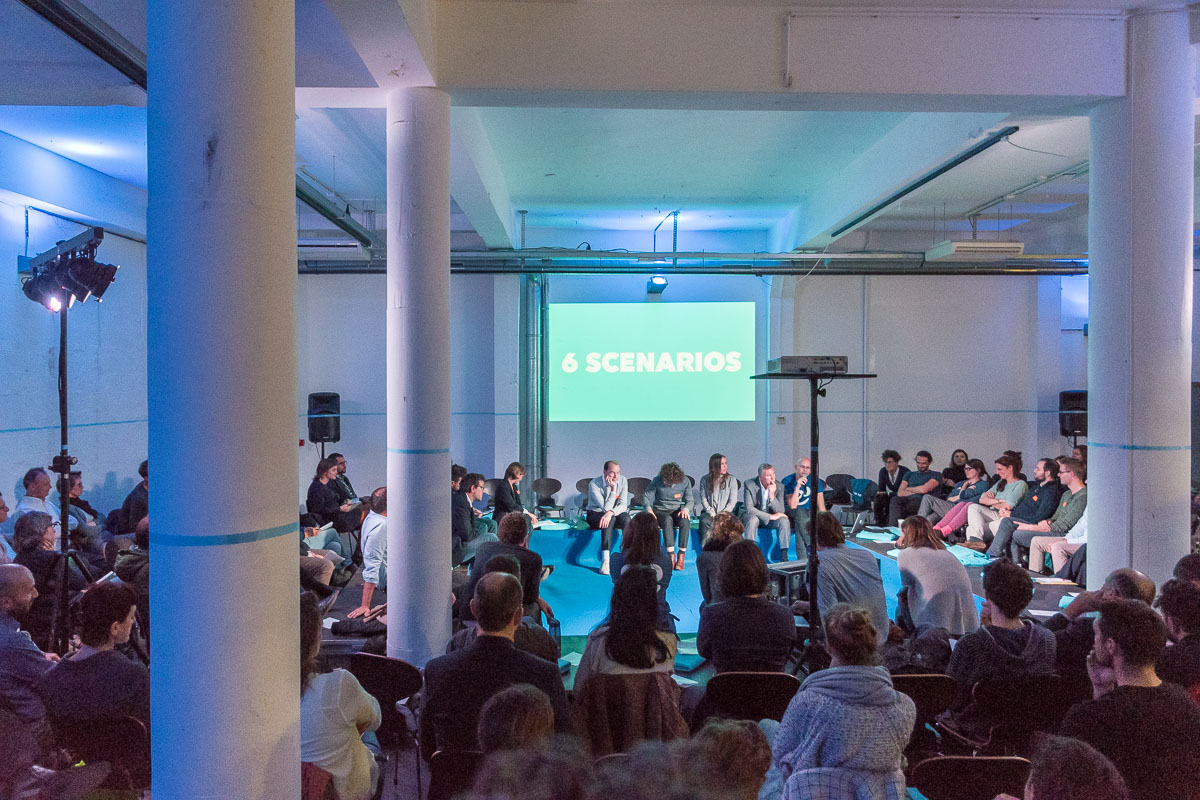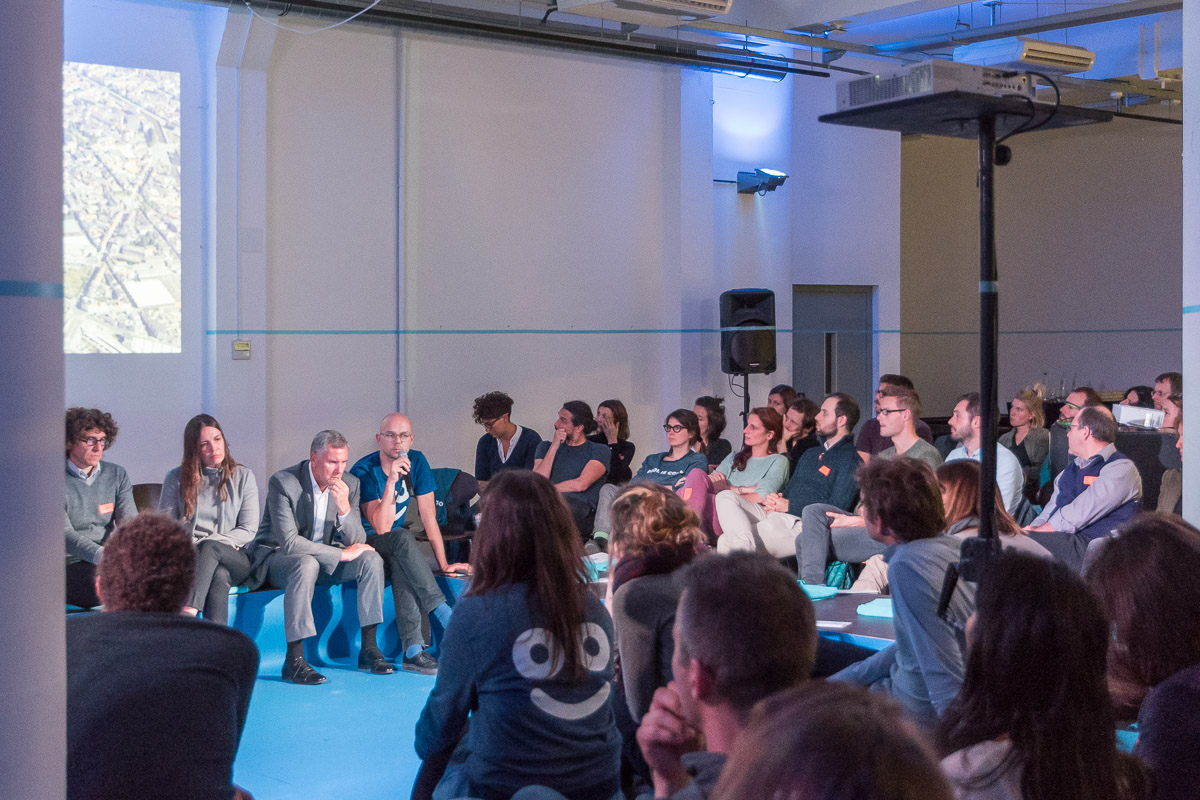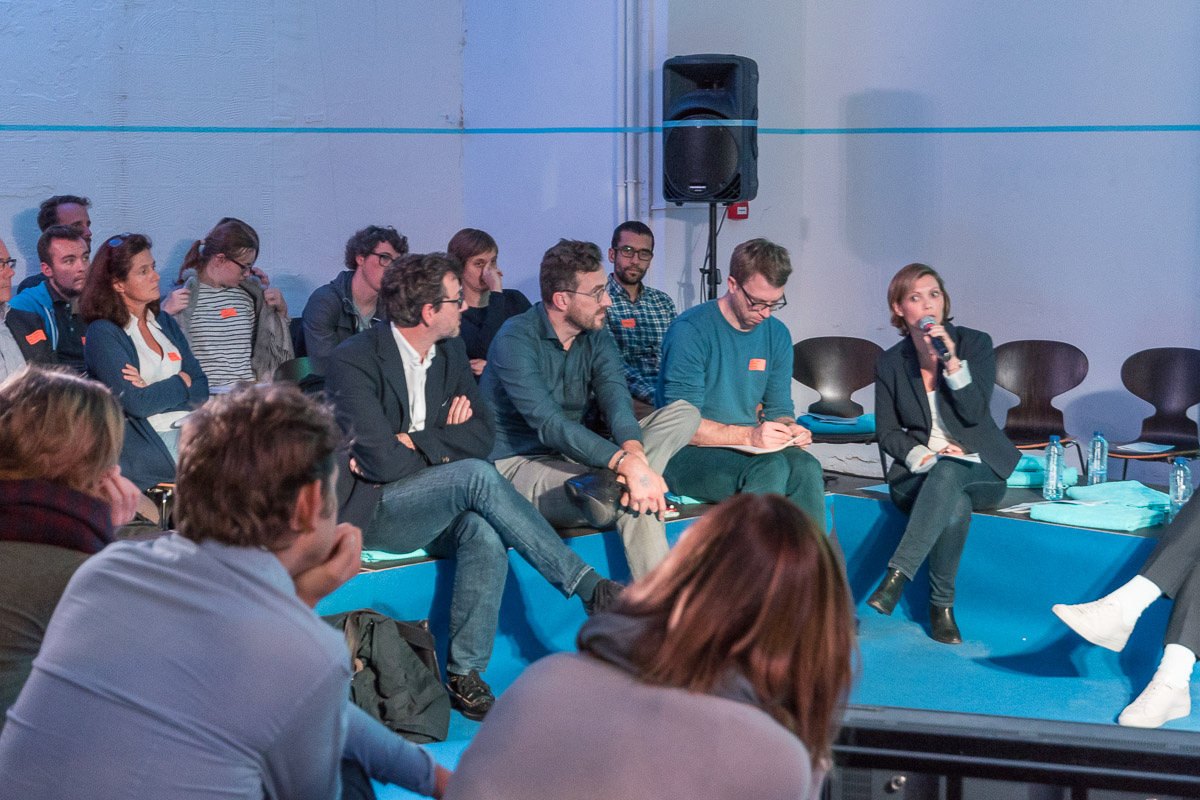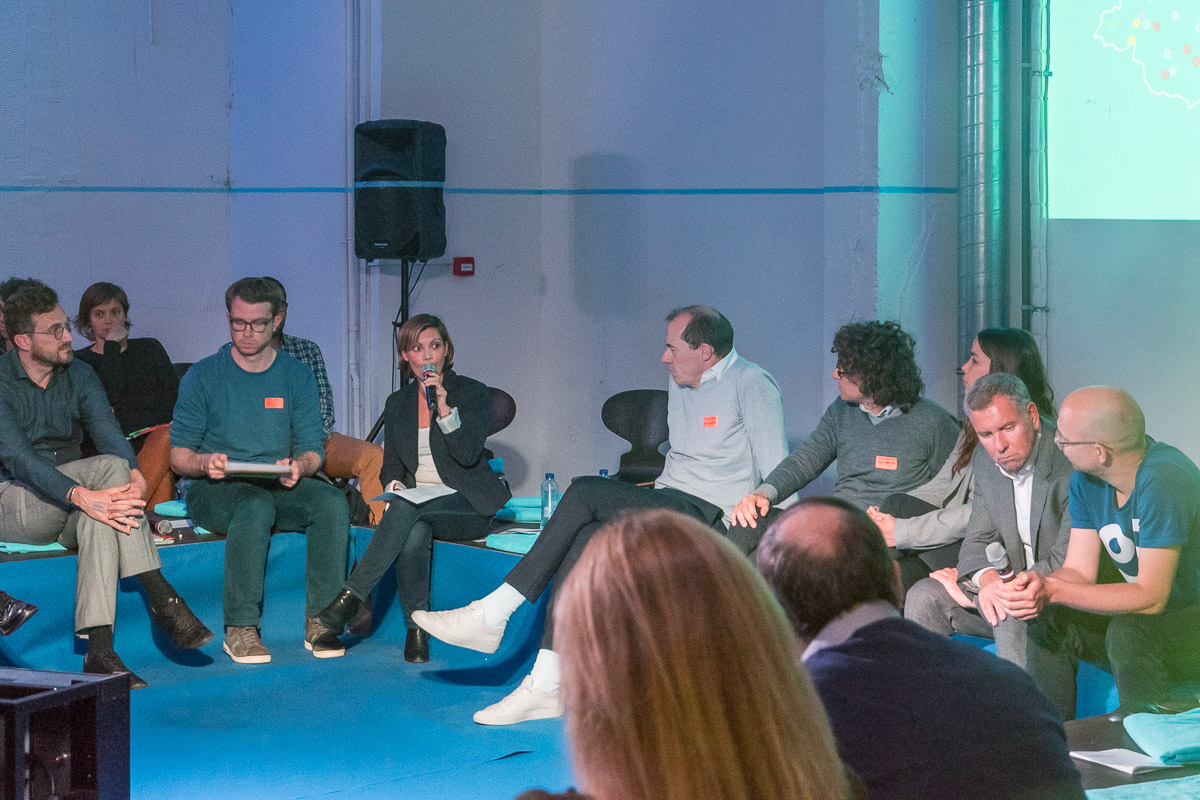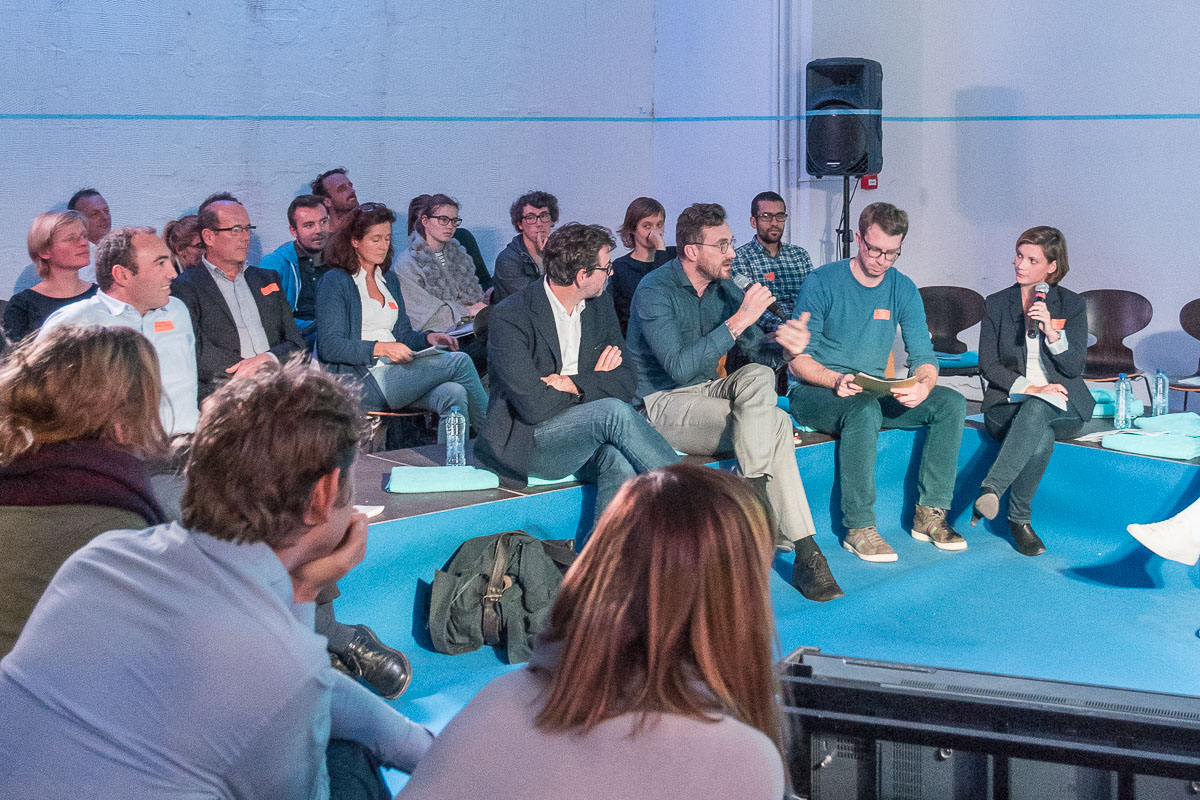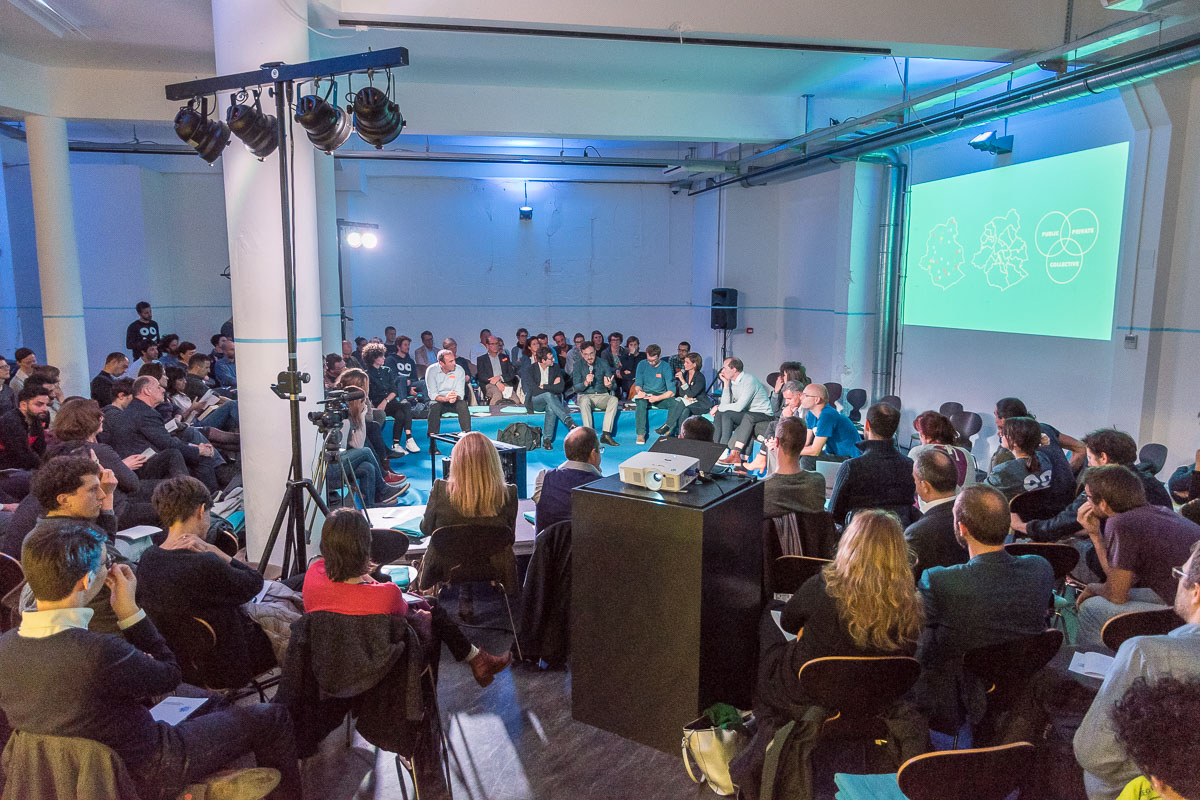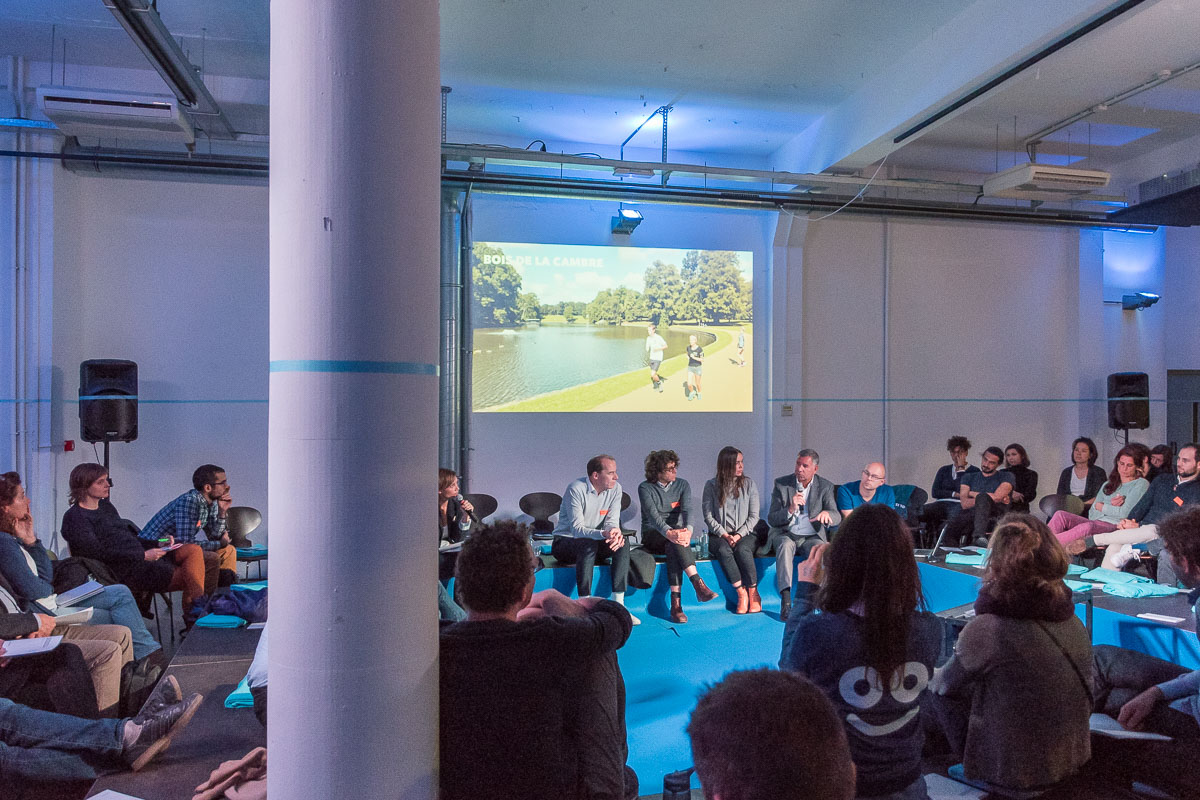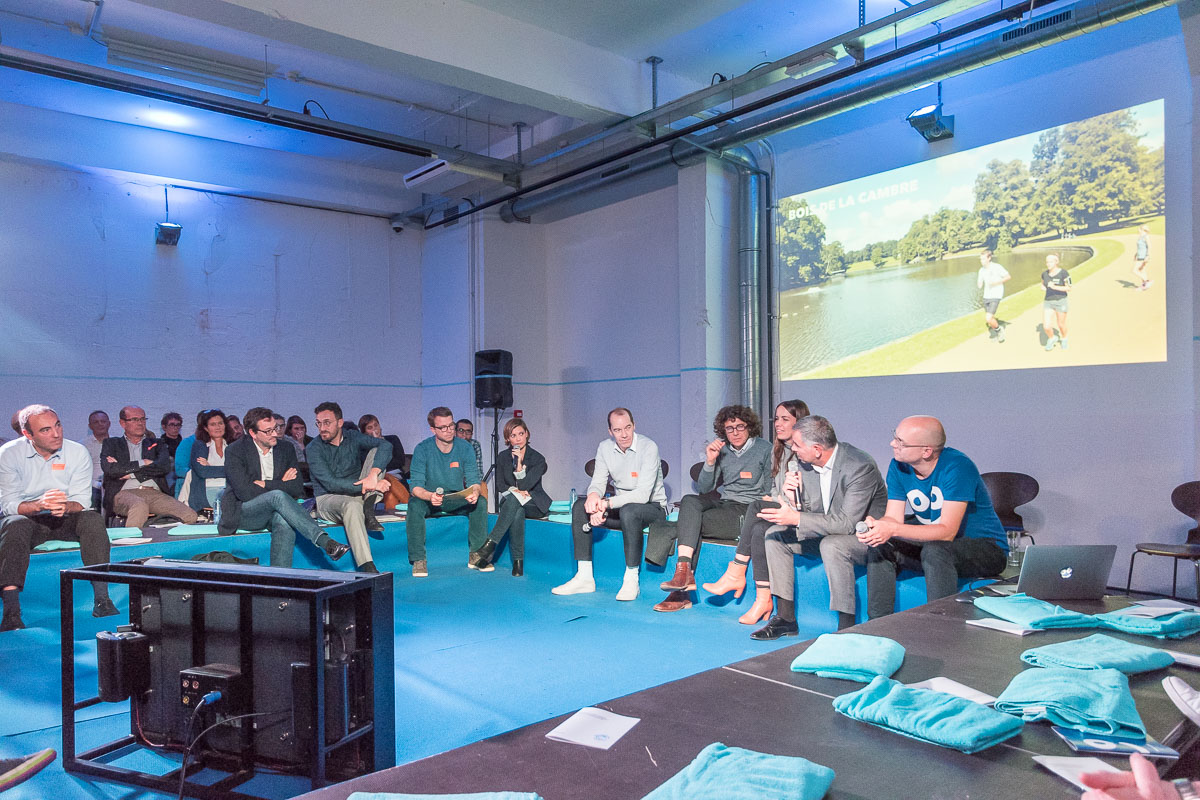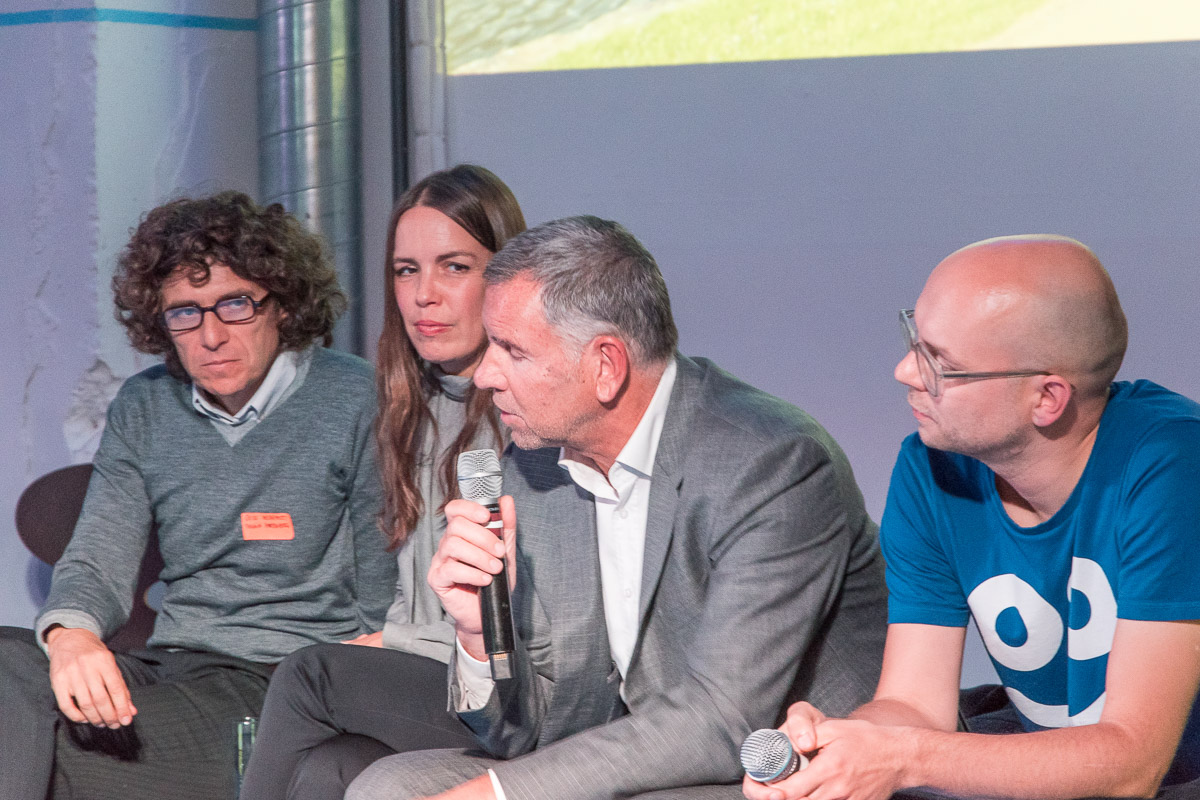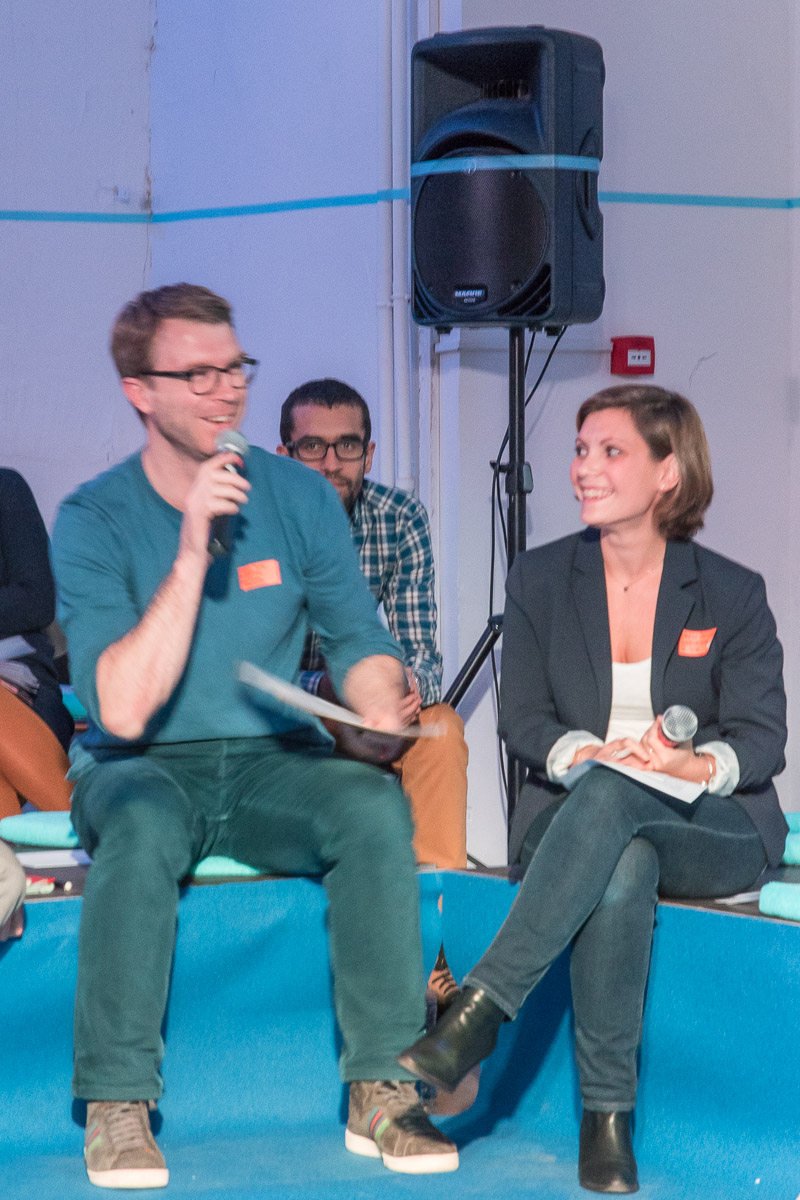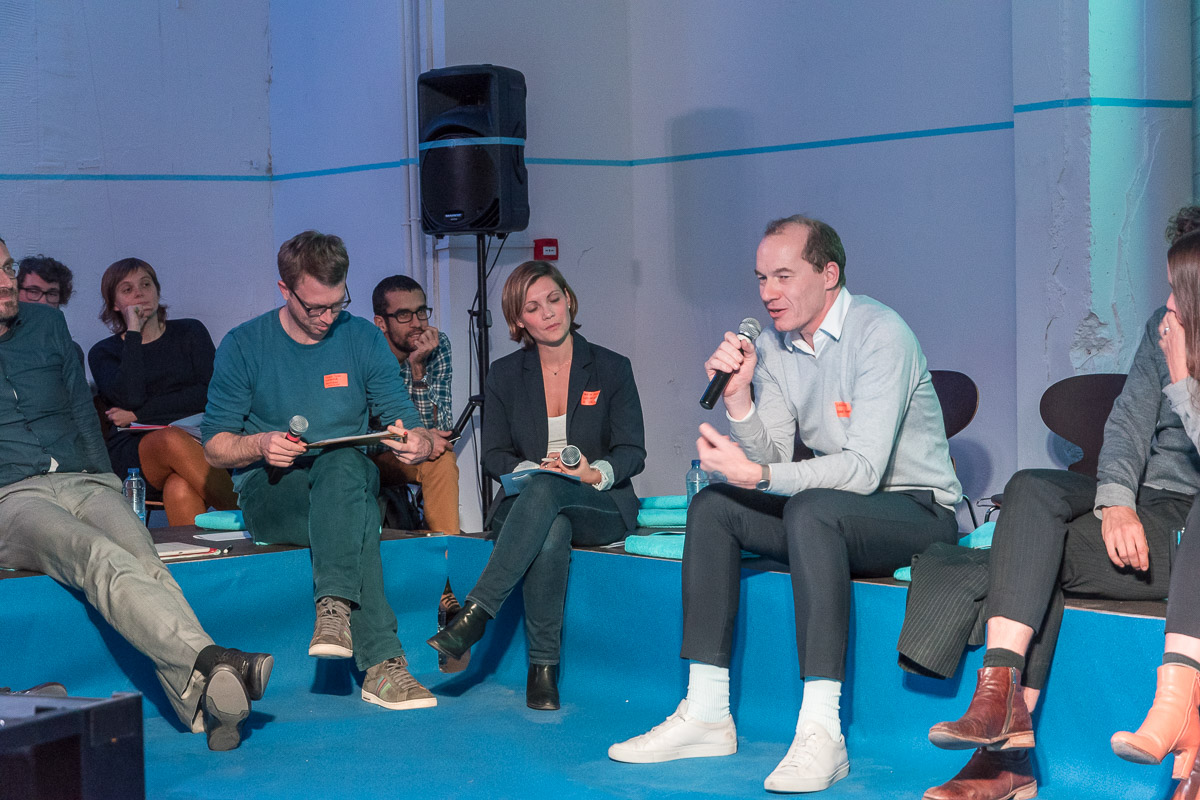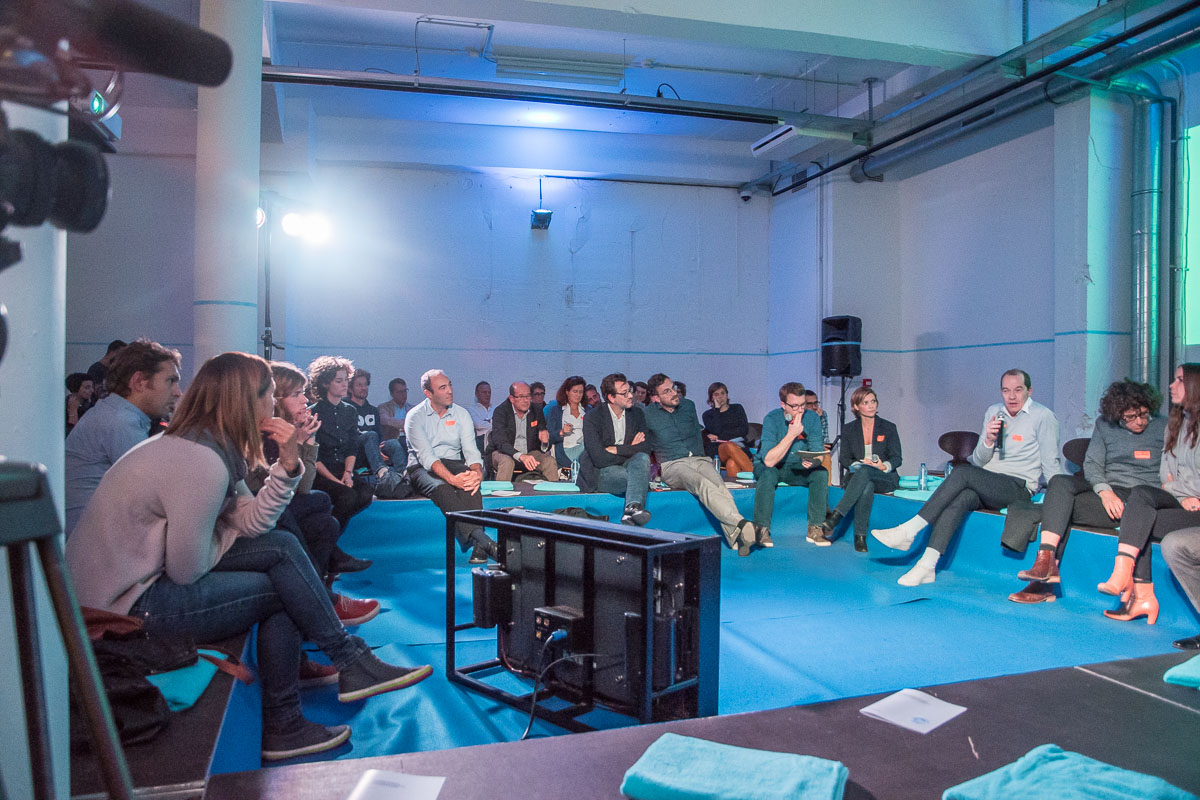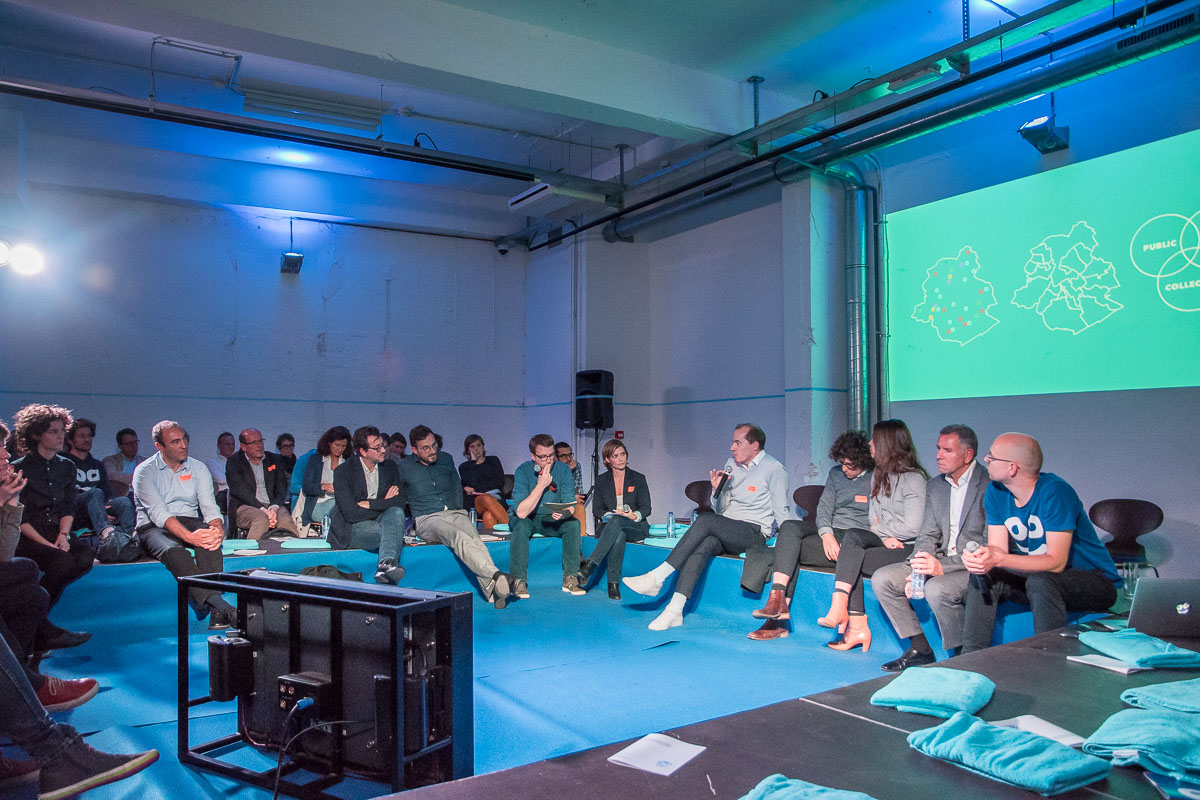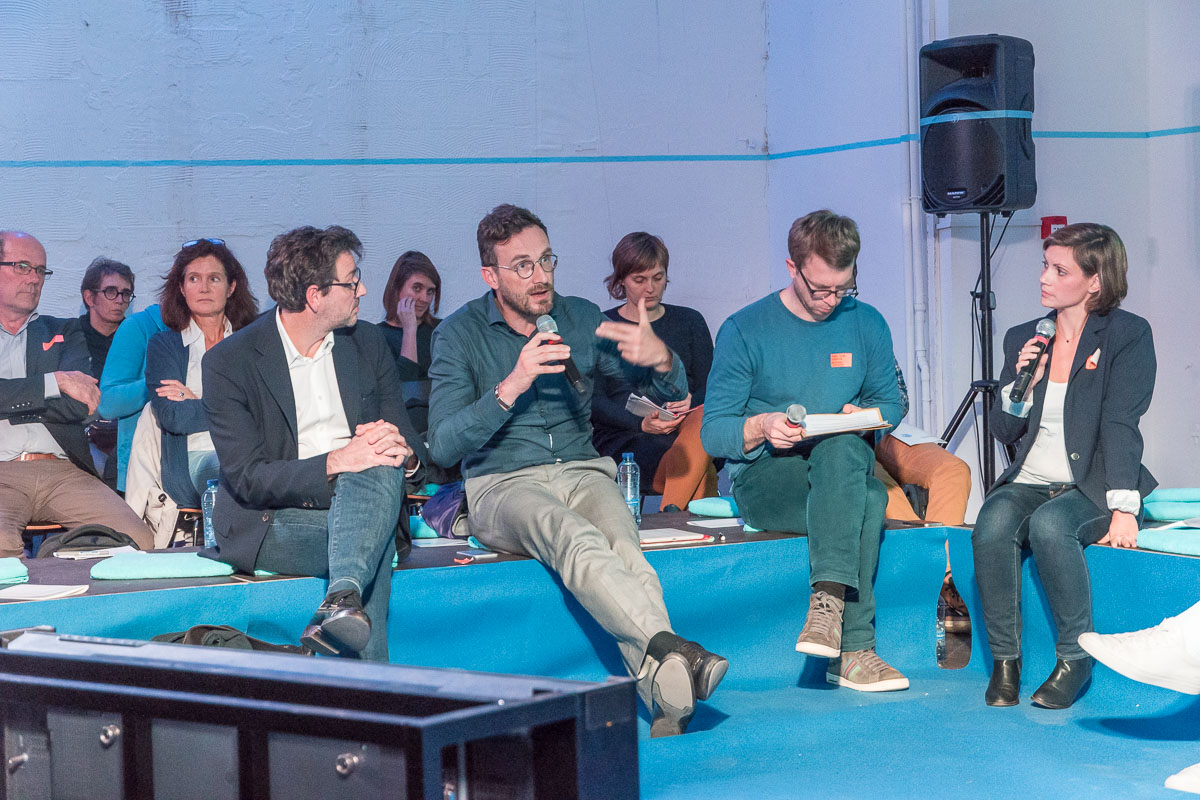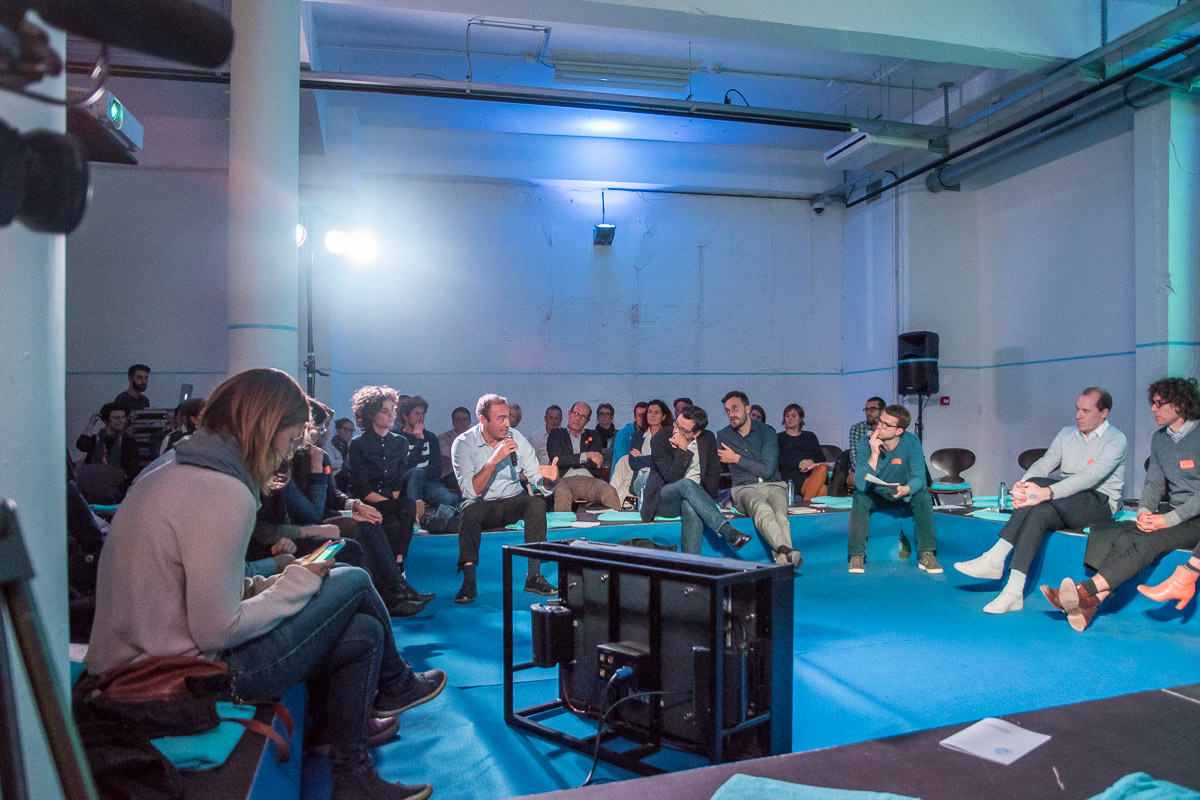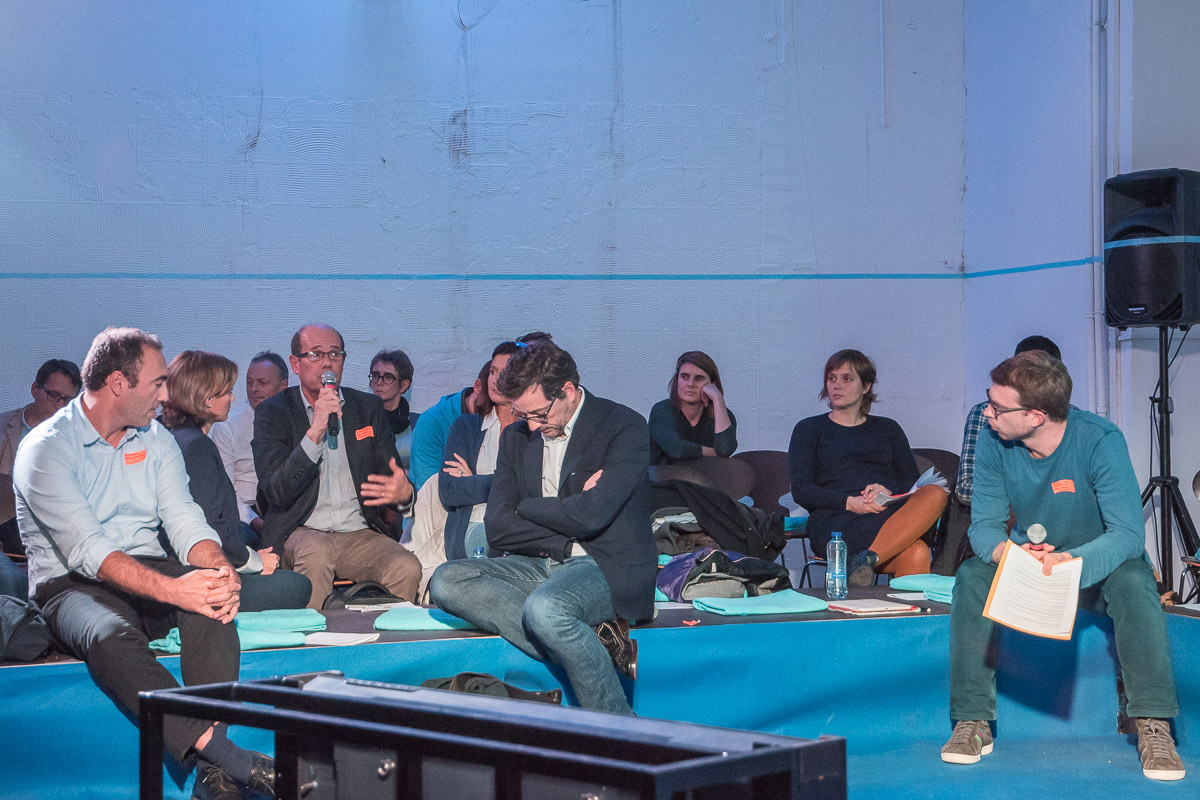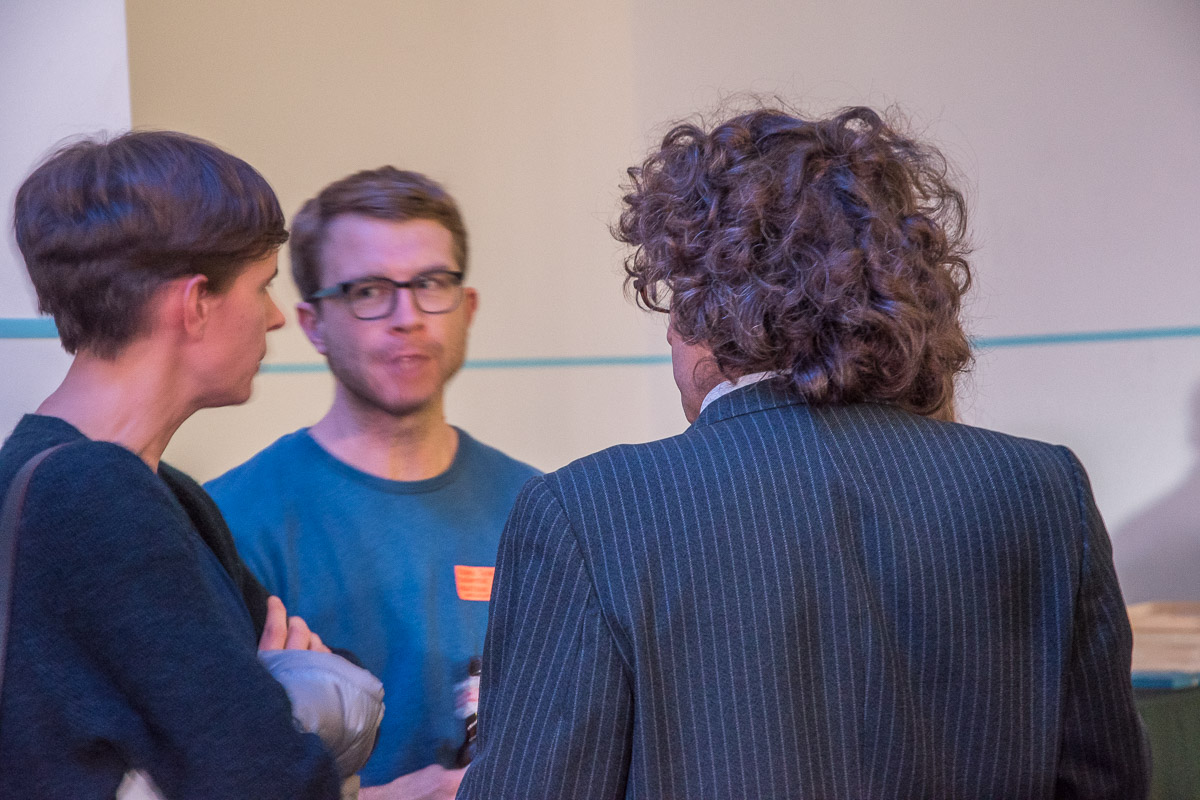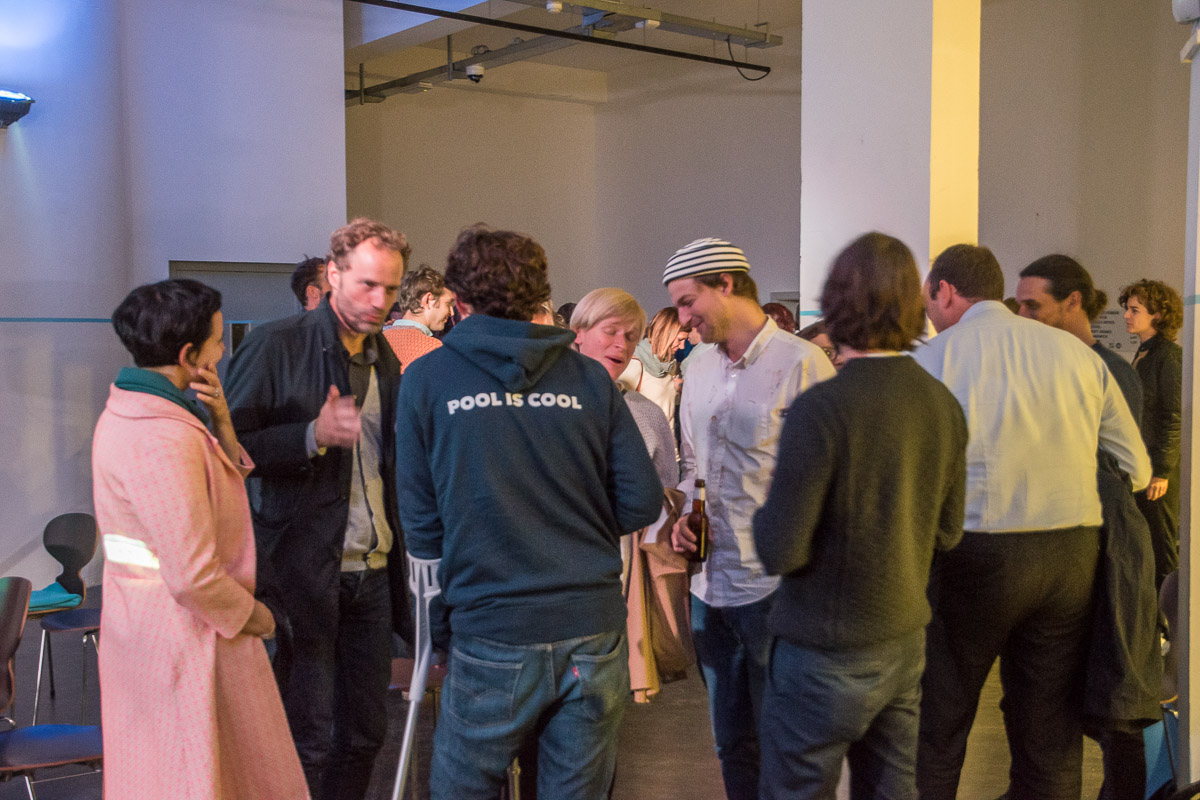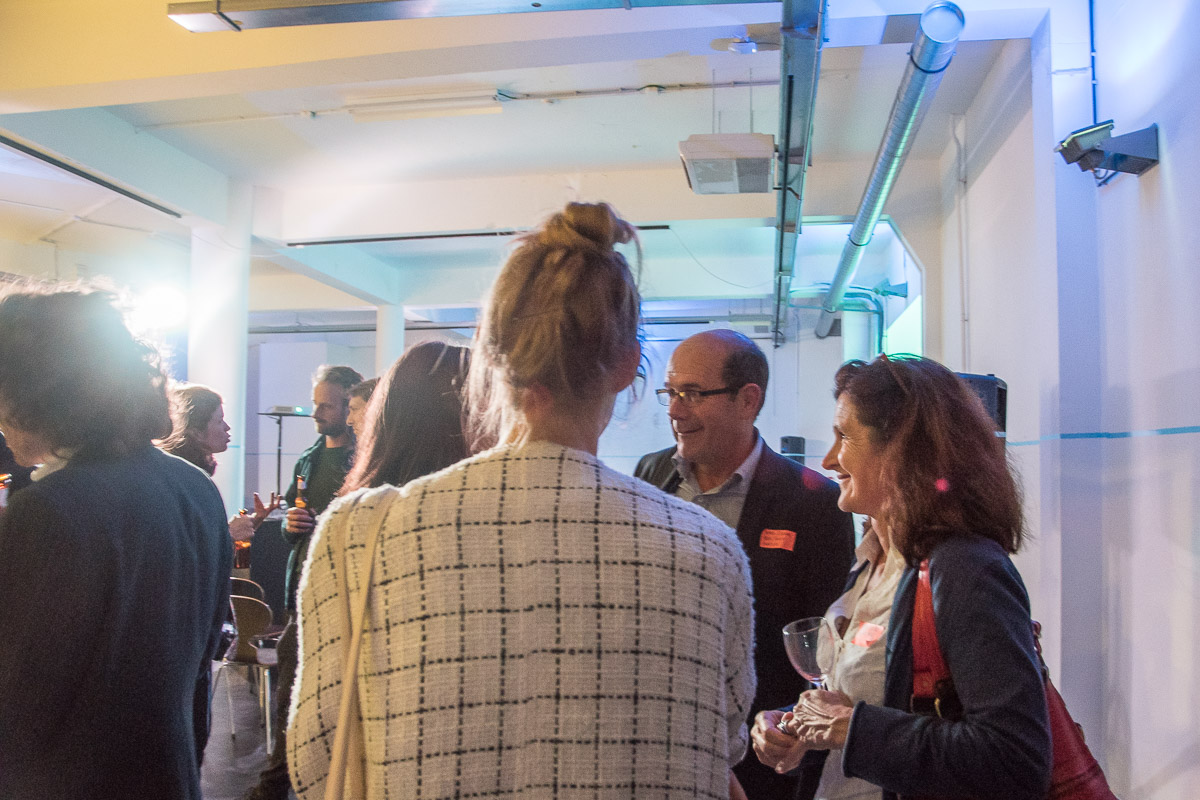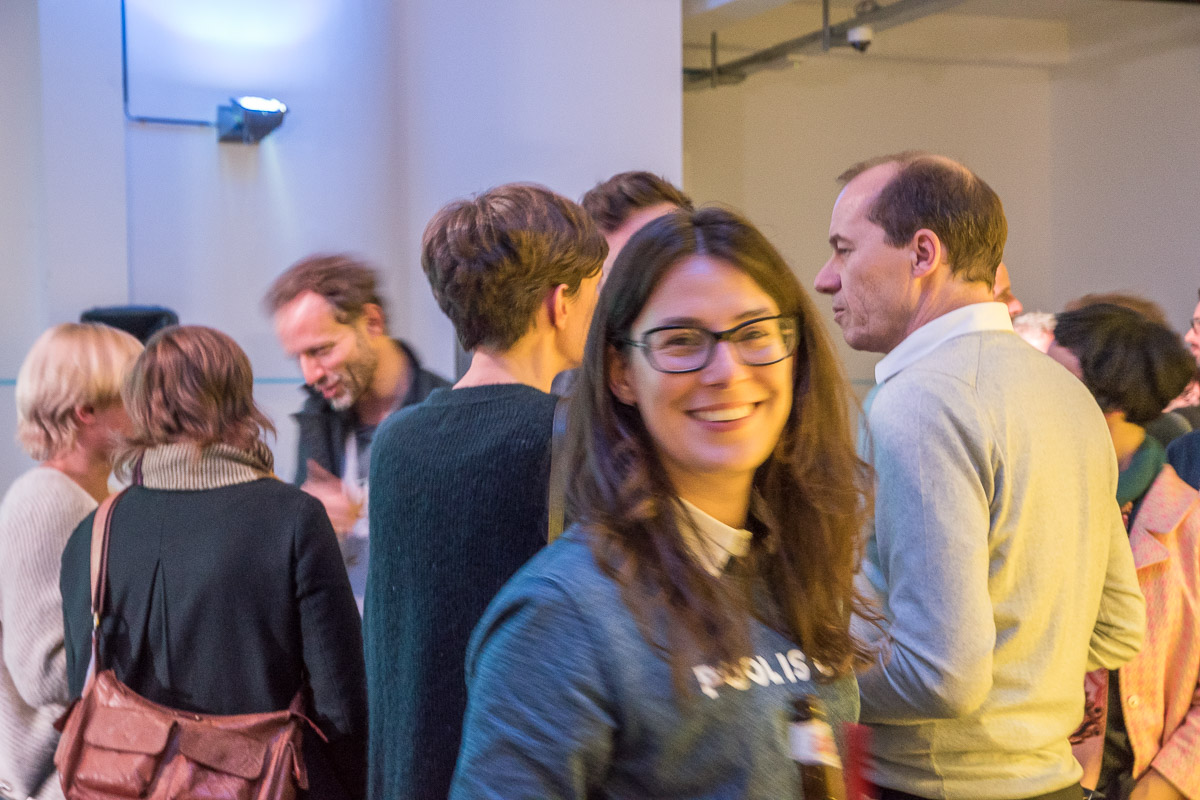OUTDOOR SWIMMING IN BRUSSELS - presentations and debate
An Evening About Outdoor Swimming In Brussels
Internationally, in the past years swimming in the city became an important topic in the debate about public space and water in the urban environment. As a result, new swimming places were realized in cities all around the world, also in Belgium.
How can the re-introduction of public outdoor swimming in Brussels become a political priority? Which decisions should be taken and who will take up the lead to make it possible? On Wednesday, 11 october, POOL IS COOL organized a public evening about outdoor swimming in Brussels with presentations and a debate, hosted by BOZAR, the centre for fine arts in Brussels.
Une soirée autour de la baignade en plein air à Bruxelles
Ces dernières années et à un niveau international, nager en ville est devenu un thème important du débat sur l’espace public et sur l’eau dans l’environnement urbain. Partout dans le monde, de nouveaux lieux de baignade ont été réalisés dans les villes, également en Belgique.
Comment la réintroduction de la baignade publique en plein air à Bruxelles peut-elle devenir une priorité politique ? Quelles décisions doivent être prises et qui aura la charge de les mettre en oeuvre ? Le mercredi 11 octobre, POOL IS COOL a organisé une soirée publique de présentations et de débat autour de la baignade en plein air à Bruxelles, accueillie par BOZAR, le Palais des Beaux-Arts de Bruxelles.
Een Avond Over Openluchtzwemmen In Brussel
Op internationaal niveau werd zwemmen in de stad de afgelopen jaren een belangrijk onderwerp in het debat over de openbare ruimte en water in de stedelijke omgeving. Als resultaat hiervan werden nieuwe zwemplekken gerealiseerd in steden over de hele wereld, ook in België.
Hoe kan de herintroductie van openbaar openlucht zwemmen in Brussel een politieke prioriteit worden? Welke beslissingen moeten worden genomen en wie zal het voortouw nemen om dit mogelijk te maken? Op woensdag 11 oktober organiseerde POOL IS COOL een open avond over openluchtzwemmen in Brussel gevuld met presentaties en een debat, gehost door BOZAR, het Paleis voor Schone Kunsten in Brussel.
SIX IDEAS FOR OUTDOOR SWIMMING IN BRUSSELS, BACKED BY INTERNATIONAL REFERENCES
After presentations by Christophe Ribet (Deputy Director of the cabinet Célia Blauel in charge of water and environment of Paris) about the ambitious plans for swimming in Paris, followed by Ooze architects (Rotterdam) talking about a temporary pool project which they realized for a private developer in London, POOL IS COOL presented 6 ideas for future outdoor swimming in Brussels:
a natural swimming pond at Neerpede,
a classical large pool at Beekkant / West Station which is accessible with all metro lines of Brussels,
a floating pool in the canal at Bassin Vergote,
a naturally filtered swimming area in the lake of Bois de la Cambre,
simple access for swimming in the clean canal of the future at Biestebroeck and
a pool on the roof of future Abattoir buildings, using the waste heat of the cooling chambers to heat the outdoor pool all year round.
These ideas were the starting point for the following debate. It was joined by Pascal Smet (representative of the government and minister for public works of the Brussels’ Capital Region), Alain Courtois (deputy mayor and elderman for sports of the city of Brussels) and Kristiaan Borret (stadsbouwmeester / maitre architecte of Brussels) to discuss also questions about political responsibilities, financing and participation.
Six idées sur la baignade en plein air à Bruxelles, mises en perspective par des références internationales
Suite à la présentation du programme ambitieux pour la nage à Paris par Christophe Ribet (Directeur adjoint du cabinet de Célia Blauel, Adjointe à la Maire de Paris Chargée de l’environnement et de l’eau) et de l’intervention de Ooze architectes (Rotterdam) au sujet d’un projet de piscine temporaire réalisé pour un promoteur privé à Londres, POOL IS COOL a présenté 6 idées pour le futur de la baignade en plein air à Bruxelles:
Un étang naturel de baignade à Neerpeede,
Une piscine extérieure de grande taille à Beekkant / Gare de l’Ouest, pôle accessible par toutes les lignes de métro de Bruxelles,
Une piscine flottante dans le canal au Bassin de Vergote,
Une zone de baignade filtrée biologiquement dans le lac du Bois de la Cambre,
Un accès pour les baigneurs dans un canal propre, dans le futur, à Biestebroeck,
Une piscine sur le toit des futurs bâtiments de l’Abattoir, utilisant la chaleur résiduelle des chambres froides pour chauffer la piscine ouverte toute l’année.
Ces idées ont été le point de départ du débat. Celui-ci fut rejoint par Pascal Smet (représentant du gouvernement et Ministre des Travaux Publics de la Région de Bruxelles-Capitale), Alain Courtois (Premier Echevin et Echevin des Sports de la Ville de Bruxelles) et Kristiaan Borret (maître-architecte de Bruxelles) pour discuter de questions liées aux responsabilités politiques, au financement et à la participation.
ZES IDEEËN VOOR OPENLUCHT ZWEMMEN IN BRUSSEL, GEÏLLUSTREERD MET INTERNATIONALE REFERENTIES
Na presentaties door Christophe Ribet (Vice-directeur van het kabinet van Célia Blauel, politiek verantwoordelijke in de stad Parijs voor water en leefmilieu) over de ambitieuze plannen voor zwemmen in Parijs, en door Ooze architecten (Rotterdam) die een toelichting gaven over een tijdelijk openluchtzwembad als kunstproject voor een private ontwikkelaar in hartje Londen, presenteerde POOL IS COOL zijn 6 ideeën voor de toekomst van openluchtzwemmen in Brussel:
een natuurlijke zwemvijver in Neerpede,
een klassiek groot buitenzwembad in Beekkant / West Station, bereikbaar met alle metrolijnen van Brussel,
een drijvend zwembad in het kanaal aan het Vergotedok,
een natuurlijk gefilterd zwembad in de vijvers van het Terkamerenbos,
eenvoudige toegang voor zwemmen in het propere kanaalwater (in de toekomst) aan Biestebroek
en een zwembad op het dak van de toekomstige Abattoir gebouwen, waar het gebruik van de restwarmte van de koelkamers het openluchtzwembad het hele jaar door zou kunnen verwarmen.
Deze ideeën vormden het uitgangspunt voor het daaropvolgend debat. Het werd bijgewoond door Pascal Smet, Brussels minister van Openbare Werken en Mobiliteit, Alain Courtois, Eerste schepen van de stad Brussel o.a. bevoegd voor sport en Kristiaan Borret, stadsbouwmeester / maitre architecte van Brussel, om ook de thema’s van politieke verantwoordelijkheid, financiering en participatie te bespreken.
A BROAD INTEREST AND THE SHARED AGREEMENT: OUTDOOR SWIMMING IS NECESSARY FOR BRUSSELS
Most noteworthy was the general consensus between the politicians, usually of diverging views, and all debaters that outdoor swimming is necessary in Brussels. Everyone acknowledge the role of outdoor swimming as a social activity that can bring Brussels’ citizens together. It was also envisioned as a way to put new urban developments in the spotlight. This must be combined with the involvement of the local inhabitants for a strong anchoring of the swimming pools in the neighborhood. While swimming places can be built and run by public, private or even collective initiatives, affordability for all citizens of Brussels should be guaranteed through public financial involvement and ownership. Also accessibility by public transport is crucial for the success of swimming pools on the metropolitan scale of Brussels.
All these questions were raised by the panel but also the audience which was comprised of representatives of the IBGE/BIM, the harbour of Brussels, Abattoir, the EGEB/SGWB (Etat gerneral du l'eau de Bruxelles), Brulabo, researchers of ULB and Ugent, the Flemish swimming federation, the Flemish bouwmeester, representatives of several Brussels’ communes, professionals in the construction of public outdoor pools and other initiatives from Belgium and France together with members of most parties active in Brussels' politics and many interested citizens.
Un intérêt et un accord largement partagé: la baignade en plein air est nécessaire à Bruxelles
Il y a eu un consensus général remarquable de la part des politiques, habituellement divergents dans leurs points de vue, et des intervenants sur le fait que la baignade en plein air est un besoin à Bruxelles. Celle-ci a été reconnue comme activité sociale dont le rôle est de renforcer la cohésion du vivre ensemble des Bruxellois et fut envisagée comme moyen de mettre en lumière de nouveaux développements urbains. Son implantation devra être mise en place en impliquant les riverains pour créer un ancrage fort des piscines dans le quartier. Si les sites de baignade peuvent être construits et gérés par les pouvoir publics de même que par les initiatives privées, voir collectives, il faut veiller à ce qu’ils restent abordables pour tous les citoyens de Bruxelles. Ceci devrait être garanti par l’engagement d’un financement et d’une propriété publics. L’accessibilité par les transports en commun est aussi un point essentiel pour le succès des piscines à l’échelle métropolitaine de Bruxelles.
Ces questions ont été soulevées par le panel d’intervenants et par l’auditoire, composé notamment de représentants de l’IBGE/BIM, du Port de Bruxelles, des Abattoirs, des EGEB/SGWB (Etat généraux de l’eau à Bruxelles), de Brulabo, de chercheurs de l’ULB et de Ugent, de la Fédération Flamande de Natation, du maître-architecte flamand, de représentants de plusieurs communes bruxelloises, de professionnels de la construction de piscines publiques extérieures et d’autres initiatives de Belgique et de France, de même que des membres de la plupart des partis actifs dans la politique bruxelloise et de nombreux citoyens intéressés.
EEN BREDE INTERESSE EN DE GEDEELDE OVEREENKOMST: BRUSSEL HEEFT OPENLUCHTZWEMMEN NODIG
Meest opmerkelijk was de algemene consensus tussen de politici, nochtans van verschillende politieke strekking, en alle deelnemers aan het debat dat openluchtzwemmen in Brussel nodig is. Iedereen erkent de rol van openluchtzwemmen als een sociale activiteit die Brusselse burgers kan samenbrengen. Zwemmen in openlucht werd ook gezien als een manier om nieuwe stedelijke ontwikkelingen zichtbaar en bekend te maken bij de bevolking. Deze strategie moet worden gecombineerd met een sterke betrokkenheid van de plaatselijke bewoners voor een sterke verankering van de zwemplekken in hun buurt. Terwijl zwemplekken gebouwd en beheerd kunnen worden door openbare, particuliere of zelfs collectieve initiatieven, moet de betaalbaarheid voor alle burgers in Brussel worden gewaarborgd door middel van financiële betrokkenheid en toe-eigening van de publieke sector. Ook blijkt de bereikbaarheid met het openbaar vervoer cruciaal voor het succes van zwemplekken op de grootstedelijke schaal van Brussel.
Al deze vragen werden gesteld en besproken door de bovenvermelde sprekers en politici, maar ook door het publiek dat bestond uit vertegenwoordigers van de BIM/IBGE, de haven van Brussel, Abattoir, de SGWB (Staten-Generaal van het Water in Brussel), Brulabo, onderzoekers van de ULB en Ugent, de Vlaamse zwemfederatie, de Vlaamse bouwmeester, vertegenwoordigers van verschillende Brusselse gemeenten, professionals in de bouw van publieke openluchtzwembaden en andere initiatieven uit België en Frankrijk, samen met leden van de meeste partijen actief in de Brusselse politiek en vele geïnteresseerde burgers.
From left to right: Christophe Ribet, Pascal Smet, Roeland Dudal, Vanessa Lhuillier, Kristiaan Borret, Sylvain Hartenberg, Eva Pfannes, Alain Courtois and Paul Steinbrück of POOL IS COOL.
POOL IS COOL DESTINED TO INTENSIFY STRUCTURING ROLE IN THE RE-INTRODUCTION OF OUTDOOR SWIMMING IN BRUSSELS
We as POOL IS COOL are very happy about the positive atmosphere regarding outdoor swimming throughout the panel and audience. The general agreement and wide interest can be the basis for a broad coalition between political parties, administrational levels and the involved institutions to overcome the Brussels’ institutional fragmentation, facilitating the next steps to make outdoor swimming reality in Brussels. Roeland Dudal, one of the moderators together with Vanessa Lhuillier, recapitulated the evening with his final words: “Let’s do it, and let’s start tomorrow!”
Being able to gather such a diverse panel of speakers and audience around the specific question of outdoor swimming shows that POOL IS COOL can take up the role of an intermediary and independent platform to facilitate the development of a strong strategy. We always said that POOL IS COOL is not only action, research and projects but also politics. As a conclusion, we will intensify our research regarding the necessary preconditions to make outdoor swimming possible. On the one hand we will bring together all kinds of stakeholders to gather knowledge and data that can back future decisions for public outdoor swimming in Brussels. On the other hand we will conduct research by design to test scenarios in the practical reality of Brussels: expect another approach to urban swimming by POOL IS COOL in the summer of 2018, somewhere in our city!
POOL IS COOL would like to thank BOZAR for hosting this event. It was supported by the VGC / Bruss-It.
POOL IS COOL vers un rôle structurant dans la réintroduction de la baignade en plein air à Bruxelles
Nous, POOL IS COOL, sommes ravis de l’atmosphère positive autour la baignade à ciel ouvert qui fut palpable dans les interventions du panel et de l’auditoire. L’accord général et l’intérêt très large manifestés peuvent être la base d’une grande coalition entre les partis politiques, les niveaux administratifs et les institutions impliquées en vue de dépasser la fragmentation institutionnelle de Bruxelles, facilitant les étapes pour faire de la baignade en plein air une réalité. Roeland Dudal, un des modérateurs avec Vanessa Lhuillier, a récapitulé la soirée en ces termes: “Faisons-le, et faisons-le demain !”
En rassemblant un éventail aussi divers d’intervenants et d’intéressés par la question de la baignade en plein air, POOL IS COOL a montré que nous pouvons prendre le rôle d’intermédiaire à travers une plateforme indépendante qui facilitera le développement d’une stratégie forte. POOL IS COOL ne se veut pas uniquement action, recherche et projets, mais aussi politiques. En conclusion, nous développerons notre recherche concernant les conditions nécessaires en amont pour rendre possible la baignade en plein air. D’une part, nous mettrons sur la table toutes parties prenantes pour rassembler le savoir et les données qui aideront aux décisions sur la baignade publique en plein air à Bruxelles. D’autre part, nous mènerons une recherche par design pour tester les scénarios évoqués dans leur réalité pratique à Bruxelles: attendez-vous à une autre approche de la baignade urbaine par POOL IS COOL à l’été 2018, quelque part dans notre ville !
POOL IS COOL voudrait remercier BOZAR d’avoir accueilli cet événement. Celui-ci a été soutenu par la VGC / Bruss-it.
POOL IS COOL STREEFT VERDER NAAR HET INTENSIVEREN VAN ZIJN STRUCTURERENDE ROL IN DE RE-INTRODUCTIE VAN OPENLUCHT ZWEMMEN IN BRUSSEL
Wij als POOL IS COOL zijn erg tevreden over de positieve sfeer rond openlucht zwemmen zowel bij het panel als bij het publiek. De algemene consensus en brede belangstelling kunnen de basis vormen voor een brede coalitie tussen politieke partijen, administraties en de betrokken instellingen om de Brusselse institutionele fragmentatie te overwinnen en de volgende stappen te vergemakkelijken om openluchtzwemmen in Brussel realiteit te maken. Roeland Dudal, moderator van het debat samen met Vanessa Lhuillier, vatte de avond samen met de woorden: "Laten we het doen, en laten we morgen beginnen!"
Het verzamelen van een divers panel van sprekers en publiek rond de specifieke vraag van openluchtzwemmen toont dat POOL IS COOL de rol van tussenpersoon en onafhankelijk platform kan opnemen om zo de ontwikkeling van een sterke strategie te faciliteren. Wij zijn er steeds vanuit gegaan dat POOL IS COOL niet alleen gaat over actie, onderzoek en projecten maar ook een politieke kwestie is. Daarom zullen wij ons onderzoek naar de noodzakelijke voorwaarden om openluchtzwemmen mogelijk te maken verder zetten. Aan de ene kant zullen wij allerlei stakeholders samenbrengen om kennis en gegevens te verzamelen om zo de besluitvorming m.b.t. openluchtzwemmen te ondersteunen. Aan de andere kant zullen we ontwerpmatig onderzoek uitvoeren om de voorgestelde scenario's te testen in de praktijk: verwacht een nieuw voorstel voor stedelijk zwemmen door POOL IS COOL in de zomer van 2018, ergens in onze stad!
POOL IS COOL bedankt BOZAR om deze avond mogelijk te maken. De avond werd ondersteund door de VGC / Bruss-it.
Full report (english only)
As the final event at end the summer season 2017, POOL IS COOL organized an evening with presentations and a debate about the future of public open air swimming in the Brussels Region.
Presentations
Christophe Ribet, Deputy Director of the cabinet Célia Blauel in charge of water and environment of Paris, introduced the Plan Nager à Paris, a strategic plan by the city of Paris to invest 150 mio € in 5 years for the renovation of existing swimming infrastructure and the construction of new swimming places, both indoor and outdoor. First results of this plan are the opening of a canal in the city centre for swimming, including a floating pool filled with water from the canal, and a project to transform an existing lake in a parc partly into a biologically filtered swimming pond. In 2024, in time for the Olympic Games, people should also be able to swim in the Seine again. These and other projects prove that technical and administrational difficulties can be overcome through ambitious and elaborate political visions and persistance in realising them. Christophe Ribet stated that the Plan Nager à Paris is based on the political ambition of mayor Anne Hidalgo to enhance the quality of life for the citizens (and visitors) of Paris and that they would be happy to share their experience with Brussels' stakeholders.
Eva Pfannes and Sylvain Hartenberg of Ooze architects from Rotterdam presented the Kings Cross Pond Club in London, a project they realized in 2015. Having “carte blanche” to develop an art project that puts the real estate development around the Kings Cross station in the public focus, they came up with “Of Soil and Water: the Kings Cross Pond Club”, a naturally filtered swimming pond embedded in an artificial landscape of pioneer plants. Being the first public pool with bioligical filtering, the pond became immediately a public attraction for people from all around London, especially the important scene of wild-water-swimmers who take a swim even in winter. Having fulfilled the necessary task to advertise the Kings Cross development, the private owner and client decided to close the pool 18 months after opening, despite the strong interest of the local community to take over the maintenance and general exploitation in the future. The project showed that through the involvement of private partners a swimming pool can be realized in short time, though it remains subject of will and interest of said private investor, out of control of public institutions. On the other hand the project became the instigator of a strong community that gathered around the pool, bringing together very different people with the shared interest to keep the pool open.
To give concrete examples on how outdoor swimming in Brussels could look like, POOL IS COOL sketched 6 possible scenarios: a natural swimming pond at Neerpede, a classical large pool at Beekkant / West Station which is accessible with all metro lines of Brussels, a floating pool in the canal at Bassin Vergote, a naturally filtered swimming area in the lake of Bois de la Cambre, simple access for swimming in the clean canal of the future at Biestebroeck and a pool on the roof of future Abattoir buildings, using the waste heat of the cooling chambers to heat the outdoor pool all year round. These scenarios could be implemented at many places throughout Brussels. But besides the type and location, also questions regarding the relation to Brussels and its 19 communes and the involvement of public, private or collective partners for realization and operation were proposed as topics for discussion during the debate.
Debate
As introduction of the debate, Pascal Smet, as representative of the government of the Brussels’ Capital Region, and Alain Courtois, in his role as deputy mayor and elderman for sports of the city of Brussels, agreed that outdoor swimming is a necessity and has to be reintroduced in Brussels. This is a noticable consent, seen the often converse political standpoints of their respective parties SP.A and MR. Something they both acknowledged themselves. They share the idea, raised by POOL IS COOL, that outdoor swimming is simply a matter of a city’s quality of life. It is important for the physical health of the Brussels inhabitants and also as a social place of encounters. For many it is the only affordable possibility for refreshment in the summer.
Asked for the first possibility for outdoor swimming in Brussels, both refer to scenarios presented by POOL IS COOL. Pascal Smet envisions a floating pool in the canal while Alain Courtois favours a swimming area in the Ter Kameren Bos pond.
A floating pool could be a substitute for the swimming pond that was foreseen in the Heysel area, Pascal Smet states. The swimming pond as foreseen in the Heysel project changed to become a shallow water playground in the most recent plans. As a location for a real swimming pool, Pascal Smet considers the Bassin Vergote, close to the Monument au travail. Also Kristiaan Borret, stadsbouwmeester / maitre architecte of Brussels, sees potential in a floating pool since it could be transferred to different locations along the canal, instigating positive change at places in the city which are currently under development and lack public facilities. Still, this placemaking has to be balanced with effects of a possible gentrification. This question, raised by the audience, is the reason why Kristiaan Borret thinks of public swimming infrastructure as public facilities in order to keep the control on the impact they have on urban developments.
On the other hand Alain Courtois is convinced that private investments, at least as subsidiary means to generate budgets, are necessary to realize projects of a size that fits to the expected large amount of users. However, we want to stress that no matter whether the budget is public, private or mixed, it must be assured that swimming places are accessible and affordable for everyone.
According to Alain Courtois, the city of Brussels conducted tests of the water of the pond in the Ter Kameren Bos which revealed an excellent quality. These ongoing test were not yet communicated and also unknown to us, POOL IS COOL. We will ask for the result and hope that they are the beginning of a structured program of water quality tests throughout the region. The swimming in the pond of Bois de la Cambre could be combined with the existing recreational function of the park. As a first measure he came back to an older proposal of temporary container pools, like THE BIGGEST POOL by POOL IS COOL, installed in neighborhoods with populations that need most urgently recreational facilities in summer.
In a reply to this idea, Kristiaan Borret states that the scale of small container pools corresponds to the possibilities of independent initiatives like POOL IS COOL and that this could be a first step, but that the public authorities must be able to do better, especially with a focus on permanent projects of a larger scale and impact.
For the future realization of outdoor swimming places in Brussels, Pascal Smet pleads to make swimming a responsibility of the Region of Brussels in a response to a question from the audience whether collaborations between region and communes exist. This responsibility should incorporate also the existing indoor pools on the long run. That idea coincides with POOL IS COOL’s proposal to organize outdoor swimming on a regional level in order to facilitate the operation of swimming places through sharing of means, budgets and knowledge.
Independent of the location or the financing, everyone agreed that it's important to involve from the beginning the neighborhood in order to embed the projects in the local community through participation in design, realization and operation. Additionally a good accessibility by public transport is a key to make the places also truly metropolitan destinations for people from all over Brussels. Christophe Ribet came back to the question of affordability of outdoor swimming for everyone. Only under influence of public authorities the entrance price can be controlled. Some of the Paris’ swimming spots are even free of charge. Kristiaan Borret added that through public financial support this could also be achieved for privately-run pools, a concept that was realized for the “Badboot” in Antwerp.
The debate was attended by representatives of the IBGE/BIM, the harbour of Brussels, Abattoir, the EGEB (Etat gerneral du l'eau de Bruxelles), Brulabo, researchers of ULB and Ugent, the Flemish swimming federation, the Flemish bouwmeester, representatives of several Brussels’ communes, professionals in the construction of public outdoor pools and other initiatives from Belgium and France together with members of most parties active in Brussels' politics.
Conclusions
This wide interest is a proof for the importance of outdoor swimming for Brussels, a topic that is predestined to play a role in the elections in 2018 on communal and 2019 on regional level. While the mutual agreement of all participants is a very positive sign for the re-introduction of outdoor swimming, a cooperation of Brussels' political and administrational institutions that overcomes the fragmented organization of our city will be necessary to develop a strategy for a sustainable long-term implementation. That should start from collecting and sharing data to the incorporation of existing studies by researchers and independent initiatives to the joint development of processes for the realisation of swimming places.
Next Steps for POOL IS COOL
We as POOL IS COOL are very happy about the positive atmosphere regarding outdoor swimming throughout the panel and audience. Roeland Dudal, one of the moderators together with Vanessa Lhuillier, recapitulated the atmosphere with his final words: “Let’s do it, and let’s start tomorrow!”
Being able to gather such a diverse panel of speakers and audience around the specific question of outdoor swimming shows that POOL IS COOL can take up the role of an intermediary and independent platform to facilitate the development of a shared strategy. We always said that POOL IS COOL is not only action, research and projects but also politics. The debate showed that this is not only relevant but necessary. As a conclusion, we will intensify our research regarding the context that is necessary to make outdoor swimming possible, besides projects like temporary summer pools or actions like the “dry swimming” events. Therefore we will focus on the one hand even more on bringing together all kinds of stakeholders involved to gather knowledge and data in order to back future decisions for public outdoor swimming in Brussels. On the other hand we will conduct research by design to test scenarios on concrete cases to verify our research in the practical reality of Brussels: expect another approach to urban swimming by POOL IS COOL next summer, somewhere in our city!

